#( misa: I KNEW WHAT I WANTED FROM THE START! me: was struggling for ages
Explore tagged Tumblr posts
Text
✰ … HAPPY FEET. just call him mumble ( solo ).
misaki has always loved to perform, the urge to take center stage innate to his very core, prevalent from his very first memories on this earth— there isn't any room to hesitate, no reason to hold back, not when he's so eager, determined, but most of all, ecstatic, to put himself on display. it's something he's done for years now, both before his time as a trainee and especially so now.
his capabilities with dancing, while having already been solid, have come a long way, his stiffer, prim foundations taking surprisingly well to the wilder, more involved choreographies often excepted of male idols and trainees. maybe that's in part to finally being allowed to let himself go more while under legacys watchful eyes, no longer held back by the restrictions a more classical genre was ruled by. it's all still technical, still intricate and taxing on the body, but it's fun.

fun, underneath it all, is what he lives for— freedom and energy and fun.
his song choices weren't ones he needed to heavily deliberate on, clear winners springing to his mind almost immediately.
even before he'd been required to pick a song he felt best showcased his best skill, hot sauce was a routine he'd already known like the back of his hand. it was loud, attention-grabbing from the start, cool— it allowed for a fairly large range of skill to be shown, certain segments requiring strong but precise movements, while others needed more relaxed, but still involved, actions. it's a little different from what he believes nknd will ultimately be, a choice he's not sure if anyone would have expected him to pick, a bit grungier, rebellious, but the same energy is there ( it's just in a different font ).
go big or go home was energetic, but energetic in a way that felt like fun for the whole crew, just as misaki needed it to be— a track that still allowed for bouncing movements while also showcasing interesting formations and duo ( and sometimes, even trio! ) moments throughout. it's a dance track, through and through, a great b-side he would've killed to have his own group originate, but it's not as intense as hot sauce. light without being too bright, tame while still delivering an impressive dance break, and somewhat adjacent to the funky fresh beats carried in new kidz on the block— yeah, this is a song he'd have wanted for himself, and he makes it known throughout every second of his performance.
#✰ . . . ( 𝗟 𝗢 𝗔 𝗗 𝗜 𝗡 𝗚 : solo ) !#lgc:nknd#( misa: I KNEW WHAT I WANTED FROM THE START! me: was struggling for ages#( needed to get this out my system needed to get this DONE
4 notes
·
View notes
Text
Aimie and Adam as Rem and Ryuk
Okay, so, I don’t know how many Death Note musical fans are musical fans and how many are just Death Note fans who wandered over and are here now. If you are in the latter post and don’t know much about musicals, this post is for you because I am going to explain Aimie and Adam’s most famous roles and how interesting that is in comparison to the shinigami.
Now, first I do need to acknowledge that Aimie and Adam are both white and shinigami are figures from Japanese folklore and should be played by Japanese actors. There’s no way around that. I’m not really from a culture that has a lot of folklore figures but I would want them to be portrayed by members of that culture. But that acknowledged, let’s move on.
Aimie has been in a lot of shows but I think most people would agree she’s most famous for originating the role of Katherine Howard in Six, a musical that reimagined the six wives of Henry VIII as a girl band group. To illustrate what I mean by that, five of these pictures of actresses playing Misa. One is Aimie as Katherine Howard.
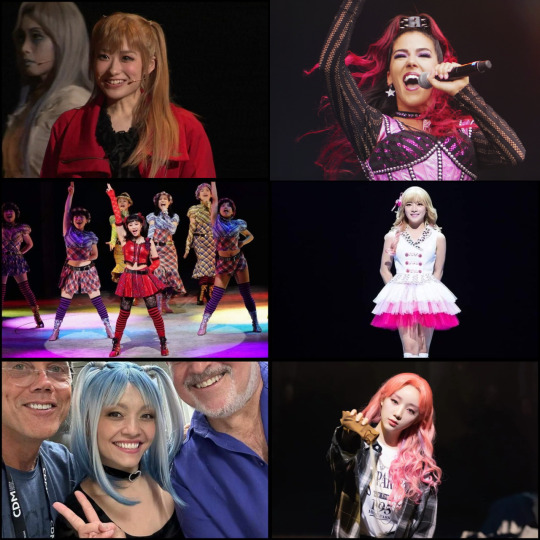
Now, a little history lesson about Katherine Howard. Her exact year of birth isn’t known but it’s generally agreed that she was probably about 17 when she married the king, and was suspected of adultery. Now, before Katherine had married the king, from the age of 13, men much older than her had groomed her and taken advantage of her and the king passed a law that to not inform him of previous relationships was treason just so he could behead her, probably before she even turned 20. History has not been much kinder to Katherine than her life was as she’s been traditionally treated like a harlot and a whore who got what she deserved as opposed to a child victim of SA.
Anyway, for Aimie to go from playing a pop princess portrayal of a tragic story of a girl who died far too young to playing a protector of a pop princess in a tragic story and to even give her own life to try and save her but to only buy her a few more years of misery? Very fascinating indeed.
Now let’s talk about Adam and Ryuk.
Adam’s most famous role is Roger in RENT
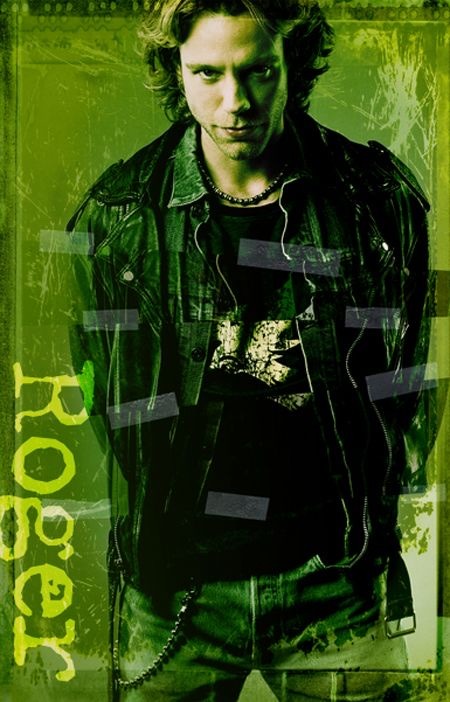
He originated the role on both Broadway and the West End and in the movie adaptation. Now, you may not think you know any songs from RENT, but you probably do. Seasons of Love, the one that counts how many minutes are in a year and all that? That’s from RENT.
RENT was written at the height of the AIDS crisis and our friend Roger here has AIDS. He was/is a struggling musician but what he’s really struggling with is his legacy. He wants to write a song. Just one song. One masterpiece, one glorious composition that will outline him. He even has a song (that’s actually better than the song he does end up writing but that’s a tragedy in and of itself because the composer knew the song needed to be rewritten but had a random heart event that killed him the day the show was supposed to start previews so he wasn’t able to get around to it) about this desire called One Song Glory.
So to contrast a character who hears the ticking of his own personal doomsday clock, who knows the end is near and feels that fear acutely and is just trying so hard to create a legacy… to have him now be playing a character who can choose the hour and the day for anyone and who believes that all human life is without meaning or consequence, regardless of any legacy they leave behind?
Absolutely fascinating choices to me on both parts and while again, I wish the roles had gone to Japanese actors, it’s hard to deny they didn’t do absolutely fantastic work.
#death note musical#death note london#Aimie atkinson#Adam pascal#six the musical#rent the musical#of course both have played other roles#but I think it’s fair to say#this is the most famous one for either of them#and putting their death note roles in the context of that is fascinating#Spotify
9 notes
·
View notes
Text
Askplosion #12 4/4:
(I would like to state for future reference that, while I do not mind long/multi-part asks, if you’d like to engage in actual discussion with me over a non-Miraculous topic, my DMs - Tumblr Messenger - should be open; I lost pieces of three multi-part asks this time just due to Tumblr not sending the remaining part(s) so yeah, I just wanted to make that clear)
(like, this askplosion ended up being super long because of this section and that’s not really what I want to have going on since I’m supposed to be a primarily Miraculous blog; I don’t want to have to stop answering non-Miraculous related asks but I might have to if this keeps up:)
.:New non-Miraculous Asks:.
Anonymous said:
What are your experiences with some really rude anons?
It’s partly my fault when it happens. Like I’ve said before, I’m an aspie, and part of what that means is I struggle to understand situations emotionally. I can come off as insensitive or read the mood wrong which often leads to people misunderstanding my intentions or where I’m coming from.
More often than not, what I’m saying will make 100% sense to me but not the person/people reading it. I also stick a lot more firmly to my opinions than I should because people tell me I fold too easily, and I come off as more egotistical than I actually am to cover up my low self-esteem lol.
So yeah, can’t think of any experience in particular but sometimes it might be my fault? At least I suspect that it is?
Anonymous said:
“Killed by kindness” makes me think of an assassin who kills people by giving hugs and compliments to people and the occasion gift that isn’t tampered until thre target does like Conrad Birdie making women swoon into fainting by singing.
omg
yes
Anonymous said:
You're watching Yashahime right now? rip
MARINETTE TAKE 2 MOROHA DESERVES BETTER
SETSUNA HAS SO LITTLE REASON TO HANG OUT WITH THE OTHER TWO GIRLS
IF I SEE ANOTHER DEUS EX TOWA I’M GONNA KICK SOMETHING
(so yes, I’m watching Yashahime)
Anonymous said:
Since someone recommended Remarried Empress, I would like to recommend my own webcomic: Princess Love-Pon! It's about a young girl named Lia Sagamore who becomes the titular magical girl and purifies people's hearts when they're tainted by the Dark Queen! It's really cool due to its diversity, the main character is black and her best friend is Afro-Latina, the villain and her prince son are also black, and there's a Japanese girl, a black guy, and an Indian girl. Plus, loads of pink and frills!
Thank you very much, though I actually don’t take recommendations, even from close friends. The Remarried Empress anon wasn’t a recommendation; they were more pointing something out to me and then I went to confirm.
Anonymous said:
Unrelated to MLB: Which Pokémon are your favourites?
I used a “Favorite Pokemon Picker” because I prefer going by generations to pick favorites and that was the easiest way of going about it. I struggle picking super favorites so here’s what I got form each generation! (my only rule was “one Pokemon per evolution line” with an exception of the Eevee line since they’re different types, and also Alolan/Galarian forms)
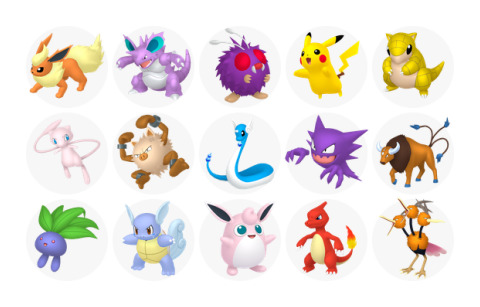
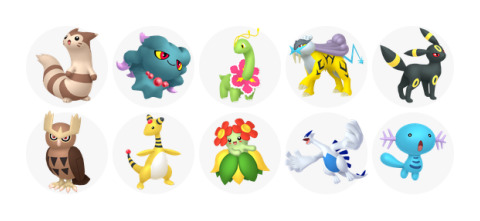
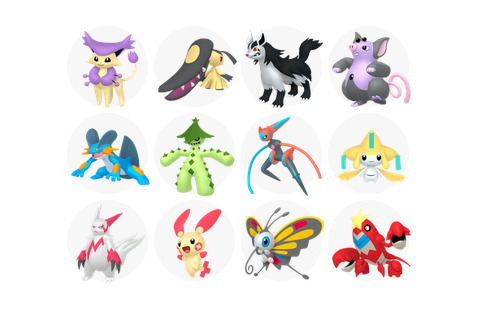
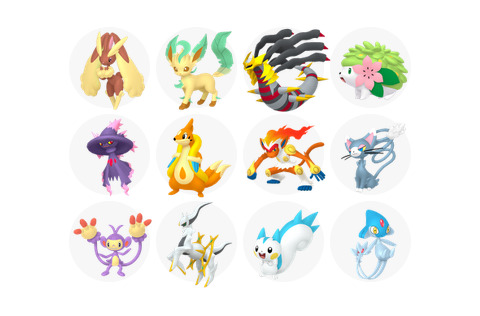
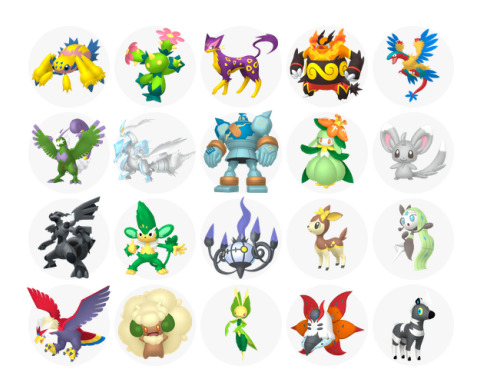
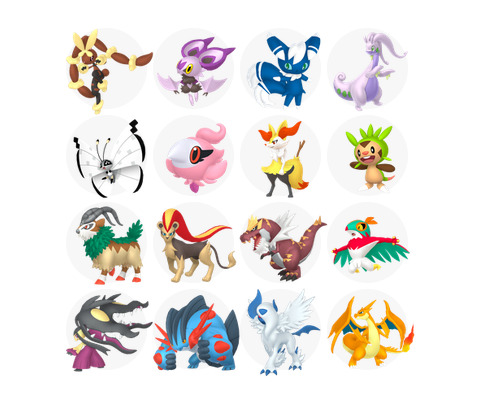
(note: the blue-patterned Vivillon is my favorite and I honestly don’t like Charizard normally but the Y version actually slims him down and gives him the wings I feel he should have; it’s an improvement of the design so it gets my seal of approval, I don’t like the X version at all)
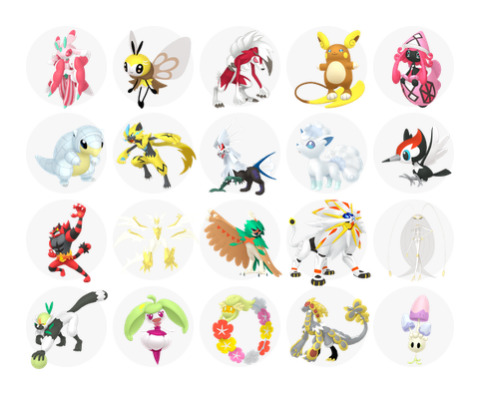
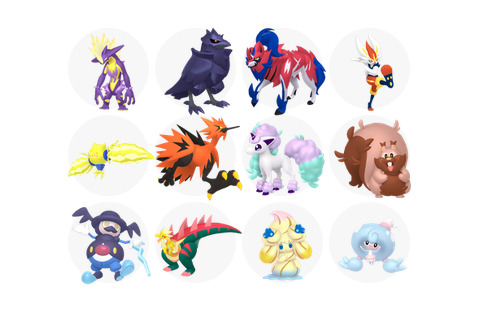
(lol I was looking through this after I was done and find it really funny how it’s like, 50% cute things and then the other 50% is just EDGY, there’s very little in-between with me I guess)
Anonymous said:
Bridgerton the Series: Yay or nay? Sorry if you haven’t seen it or it’s not your thing. I was just curious.
Never seen it, though when I brought up to someone, they didn’t recommend it to me at all ahaha.
Anonymous said:
I previously kept having this argument about The Bechdel Test with someone. She keeps insisting that the test is invalid because there's nothing wrong with talking about men and that it was created for lesbians only, and not for feminists, with the implication that being a lesbian somehow means that you dislike men or want them gone. And she also thinks the test is about NEVER talking about men, rather than merely occasionally talking about other things. I keep telling her otherwise, but...
jdfhkgdfhjgdfg “lesbians only”
now all I can imagine is “lesbians only” sections at restaurants and such
Anonymous said:
Have you ever played Akinator, with or without the Miraculous Ladybug characters? Because I played it with Ochaco from MHA and Marinette and he guessed them within a second(can your character control gravity? Is your character a protagonist?). I even played it with myself as the "character" and he guessed "your shadow" lol. How about you?
I’ve played Akinator before but I don’t specifically remember what I was searching for lol.
Anonymous said:
The cast for the newest Power Rangers series got revealed, and I hate that as soon as I saw the Pink Ranger's bio mentioned she was an internet journalist, I thought of Alya. I really hope she doesn't have the same problems as Alya in the series proper.
fhgdfkgd journalists have been ruined for us forever
Anonymous said:
Have you noticed that in many shows, especially shonen shows, people tend to hate the most "feminine" female character? Like, in Naruto it was Sakura, in Death Note it was Misa, in My Hero Academia it was Ochaco(although a lot of people like her so I'm not so sure about that last one?). The most hated character in one too many a shonen is almost always the "girliest" of the characters. They're always claimed to be useless or reliant on a man. And this is within the fandom who should know better!
It probably didn’t help with Sakura that she was decked out in pink hair; that’s an instant girl label for you (or lesbian label, depends on the person :P).
I don’t think I’ve been in enough fandoms to have such an experience but I definitely see where you’re coming from.
Anonymous said:
Rewatching Chat Blanc and Here To Help from Star vs. and hearing Adrien/Marco tell Marinette/Star that they always liked the girls from the beginning makes me so pissed. It's not that I don't ship Starco(I do! But I also like MarcoxJanna), although I don't ship the love square, but I'm so annoyed with writers finding the need to make the audience "know" that the main ship's characters "always" liked each other, as if that makes their love for each other more true, even if it's obvious they had other crushes? Like, what happened to Kagami Tsurugi? Jackie-Lynn Thomas?
News flash: Teenagers are allowed to have crushes on multiple other people before they find "the One". It doesn't mean their love for that "One" is any less valid. And if you still want to pull the "they always liked each other since they first met", at least make it actually TRUE!!! Don't have them have crushes on other people before moving on to the "official" crush and be all like "Oh, by the way, I liked you from the start," when it's dead obvious they didn't. You're doing a disservice to the romantic "false" leads.
I'm willing to forgive Star's crush on Oskar and Tom since she's not the one claiming she always liked Marco(even though she fell in love with him LONG before he fell in love with her, which is a nice turn of events), although her "love" for Oskar was merely an infatuation at most and I personally don't see why it was needed. Why don't they just say that their old crush didn't do it for them???
UGH, I remember watching that show and being so annoyed because I really liked Marco and Jackie and wanted them to be a thing but I knew that they’d pull Starco in the end because of course they would.
It also totally makes it seem as if love is the most powerful relationship there is (aros would like a word), which is so bizarre when there are so many “power of friendship” tropes. Like, a male and female lead have to get together because their relationship is the strongest.
The love square would hold so much more meaning to me without this love drama nonsense. It’s tiring.
Anonymous said:
Have you seen Yuki Yuna Is a Hero? If so, then what are your thoughts on it? I was thinking of watching it but it seems to be another "taking away the empowerment of the magical girl genre by making the girls suffer instead" type story. I read about it on TV Tropes and apparently it's a deconstruction that takes after Madoka Magica which already puts a bad taste in my mouth, but then I got to the examples and they're basically about how girls who get magical powers lose their body parts one by one and that the reason only girls can be heroes is because "young girls have always been sacrifices".
Not to mention it was written by a man and aimed towards a seinen(adult men ages 17-35) demographic, making it torture porn for adult men. Also, both the laconic page for Yuki Yuna and Madoka Magica say "Being a magical girl sucks."(though for Yuki Yuna it adds "Unless you have the power of friendship.") and to be honest that kills any desire in me to watch the show. Should I give it a chance?
Oof.
Yeah, after bringing it up to a friend of mine, it was instantly recommended of me not to watch it, so I’d say, “no.”
Anonymous said:
Let's make one thing perfectly clear. I, love, love, LOVE Sailor Moon. And I love the transformations, too. But if there's one thing I don't love, it's that their outfits all look pretty much the same but with different colors/different lengths of gloves and shoes and stuff like that, and that they all have the exact same body type save for the one fat girl who's made to look bad. I don't like Madoka Magica, but at least they all had unique/different costumes(but they still have similar bodies).
We’re not allowed diversity here. Take your different body types to a show that cares; we’re all about femininity here and how girls can be beautiful and powerful no matter wha--oh wait...
Yeah, I don’t care for the design in Sailor Moon, but that’s because skirts don’t interest me design-wise unless it’s really unique/interesting.
(note that there’s a lot of talk about tomboys, sexism, and TV tropes and such below, and then Madoka Magica after that; that’s basically the rest of this askplosion:)
Anonymous said:
I just saw the thumbnail for a video called "Why You Should Watch Princess Tutu(Yes, I Know The Name Is Stupid)". Umm, why is it stupid exactly? Because it's "girly"? What is with people thinking that in order for a girly show to be good they have to first separate the show from its girliness in order to enjoy it? It's like how men will say a show is good despite it being girly, or that since it's good it's no longer girly. Nobody does this for boy shows, because boy things are "never" stupid.
Princess = girly thing
Tutu = girly thing
girly things = bad
That’s the formula~ They should’ve called it something edgier and manly so that more people would be interested.
Anonymous said:
I'm wary of any woman or girl who says, "I'm a girl, but I'd rather read books about guys" or "I'm a female writer but I mostly write stories about male characters". I feel like those women are the "not like other girls/one of the guys" type who suffer from internalized misogyny and don't like female characters. I also feel like they're the type to not care about female representation, because in their minds, girls shouldn't care about female role models. We can enjoy males just as much! I do!
To be fair, they might also just be writing about shirtless men doing “handsome” things. ;P
But nah, I see your point. Me personally, I try to find a balance of writing both, but I do think there can be bias.
Anonymous said:
Do you think it's okay to like a ship but acknowledge that it wouldn't be safe or healthy or condonable in real life? Because I was just thinking of how a lot of people like some really "toxic" ships like Veronica/JD in Heathers, Yuno/Yukki in Future Diary, Madoka/Homura in Madoka Magica(although some people don't like it because of its toxicity/like it but don't realize it's toxic), almost any villain/hero ship, the list goes on. But they're aware of the fact that it's not a good standard for healthy relationships in real life.
An alternative I've seen is people having a crush on "dangerous" characters like JD and Yuno, or Karma from Assassination Classroom(there's not a single video on YouTube with him in it that DOESN'T have comments full of people saying they want Karma to father their children), but still being aware of the fact that the character is a) not real and b) wouldn't be a good partner if they were real(and that's assuming they even want to be with you. But sometimes there's a good reason for falling in love with a "toxic/dangerous" character.
Take Monika from Doki Doki Literature Club! She's obsessed with the player(not the player CHARACTER, the flesh and blood player themselves) to the point of killing off all the other girls and "trapping" you in a room with her where she talks endlessly about lots of things. But she's actually a lonely girl who's driven insane by the fact that nothing around her is real. She latches on to you because you're the only other person who's real and sapient and has got a mind of their own. You're literally her outlet to the outside world.
She's personally my favorite character in the game due to her actually being a more fleshed out, sympathetic(and not in the idealized "moemoe" way), and realistic take on the Yandere archetype(which, like many moe archetypes, is kinda misogynistic in nature in that it reinforces submissiveness; it's basically animes version of "woman scorned".). So it makes sense that people would sympathize with her and want her to become real, because all she's ever wanted was to be real and to talk to real people. Especially since she really did care about her friends and even returned them back to life because she saved their backup files, taking herself out of the picture.
I read a few "Monika becomes real and lives with you" fanfictions where she's really sweet and not at all crazy and cares for you a lot, and it's never felt the same as all those other "Yandere/psycho lives with you and is your girl/boyfriend" type stories precisely because those stories tend to just glorify possessive partners that kill your loved ones, drive your family members to commit suicide, and tear up your stuffed animals and dollies for the sake of it, rather than go into why they're so crazy for you, and often reinforce Stockholm Syndrome.
Plus, those "things" she talks about in the empty room? They're actually quite smart and make you think about the world for a bit. Not many "crazy" type characters actually get that. They're all about how "I'll slice your boyfriend open with an axe if you don't date me wa ha ha", and even if they're not, it's all the fandom will focus on, to the point of ignoring any and all other aspects to their character. Because that "crazy in love" aspect is the most appealing part of them. Maybe it's due to forbidden fruit/bad boy(or girl) appeal? Who knows? But I'm starting to wonder if it's still as bad if people recognize the problematic aspects of "crazy in love" characters or "dysfunctional" relationships.
Because if they recognize it's not real and don't really want it for themselves, then it's probably not much of a problem. But if they just go on wanting it to be real and never take a step back and go "wait a minute, this isn't real love; they're only together because he latches onto the first girl to show him any kindness and affection and she's a doormat who doesn't want something bad to happen if she leaves him", then that's bad.
Obviously it's not as bad as being in love with literal stalkers, killers, and rapists in real life(which is an actual thing, believe it or not, it's called hybristophilia), because fictional characters will never be real. Karma Akabane will never be real. Yuno Gasai will never be real. JD will never be real. But loving fictional characters who do those things and not realizing the problem with it may cause people to seek out real criminals, so it's best to separate fiction from reality.
I can’t help judging a little internally, but yeah, I think people can ship whatever as long as it has that “not in real life” scenario going for it. It’s ultimately fiction, so just because I don’t like it and/or think that it’s bad doesn’t mean other people can’t ship it.
Anonymous said:
I'm getting tired of all the racists on TV Tropes getting upset whenever a trope has a Japanese name. Whether it's Tsundere, Yandere, Meganekko, Genki Girl, Bokukko, or any Japanese anime name, people will complain that the trope exists beyond anime so it shouldn't have a "cute anime name", and that it should instead just be given a broader(read: English) name with the same meaning. Or that the site is too obsessed with anime. I'm just sick of people saying that anime names are bad.
The other thing is that we don’t actually have English words for certain things? I mean, the whole reason we say, “tsundere,” is because it says everything in one word. It’s easy.
(Also, people are aware the the English language isn’t some unique thing that takes no inspiration from other languages, right? It’s a mix of things, so accept that other languages exist because we literally wouldn’t have English without them.)
Anonymous said:
Have you seen the TV Tropes reviews for "My Little Pony: Friendship Is Magic"? Holy crap, they are all a perfect example of the "Real Women Don't Wear Dresses" phenomenon that I have mentioned earlier and is so fucking present on this site. While some reviews praise the show for showing that "it's okay to be strong AND girly"(such as Hadles' review, which was really splendid), and that girl shows are no less good, others either insult the show by calling it "girly, saccharine, and stupid" as if "girly" is synonymous with anything bad about a show, or feel the need to distance it from its girliness in order to praise it as if a show can't be good if it's also girly.
Some people were saying things like "the show might seem girly at first, but it's actually a good, brilliant show with intricate plot twists, well-developed characters, and even some scary moments" and "the characters aren't just shallow girly-girls, they have depth!" So what, girliness is mutually exclusive to anything of value? One person even said that the Girl-Show Ghetto was the reason they couldn't get into the show or respect it. Just...wow.
And one review even said "Rarity's pretty tough for a girly girl!" Excuse me? Tough FOR a girly girl? So being a girly girl somehow automatically disqualifies you from being tough? Like "yeah, she's tough despite being a girly girl! Because girly girls aren't supposed to be tough."
It reminds me of the phrase "you're pretty for a black girl", which, while it's never been said to ME, I have heard other people complain about. It's sick and it hurts, just like this. And the few people who didn't say things like that still said that they couldn't get into the show at first because it looked "girly and vapid", before changing their minds and thinking that the show either proved their biases about girly shows wrong, no longer think it's girly since girly shows "can't" be good, or like it "despite" it's girliness.
And there were 70 reviews in all. 70 reviews full of this misogynistic "girly is bad" shit. So in conclusion nearly all the reviews on TV Tropes for My Little Pony: Friendship is Magic were along the lines of one of three things. 1) "This show is girly so I looked past it because girly shows are dumb." 2) "This show is good despite being girly/the characters are good despite being girly." and 3) "This show is not girly to me at all because it is well-written and captivating and girly shows aren't capable of such things."
Granted, some people there were able and willing to call out those who judged the show badly for being girly(or gave it the "not like other girls" treatment, but in show form), as well as people warning other potential viewers to get rid of any potential bias they may have against it due to it being girly. But there were still more people insulting its girliness as a reason they think it sucks or denying its girliness to justify their liking of it than the other way around.
I would've accepted it in the form of "If you think this show is bad because of its inherent girliness, then you are wrong!" or "This show is proof that a show being girly or aimed at girls doesn't and shouldn't take away from its value, as people seem to believe." or "A girl can be girly and be a strong female character.", but no, instead I got shit like this. It's especially insulting when TV Tropes is a site that devotes itself in part to critiquing sexist tropes found in media, only to turn right around and reinforce them.
I don’t read TV Tropes that frequently, so I fortunately missed out on all of these complete idiots who associate girly products with being bad.
(that “pretty for a black girl” comment makes me hate all aspects of “expectations of beauty” and it’s like--plz let these die)
I could maybe see an argument for criticizing a girls show for being “saccharine” if it were like, “girls’ shows written by men who clearly don’t know how to write girls are usually bad,” because then it’s not a criticism of girls’ shows exactly but rather who keeps being put in charge of writing them.
Anonymous said:
I get so annoyed when people get upset when confronted with the matter of female representation with "what's so wrong with one show having a male protagonist or mostly men and one/a few women? Why do we have to include women in everything?" These people clearly do not understand that one show doing it is one thing, but when multiple shows do it, it's an obvious problem. It's even worse when they turn around and diss shows with largely female casts for "not having enough men".
And as for people getting upset that "every show has to include women/come with a checkbox nowadays", as if it's bad to include women in your story...look around. Women make up 50% of the population. They're literally everywhere. What reason do you have to not include a substantial amount of women?
These people act like male is the default and women are a last resort. They see no problem with men dominating a cast because it's justified(despite that not reflecting real life), and yet having female characters, or, hell, a female-dominated cast(I know they also don't reflect real life, but there are still female-dominated spaces; most colleges are 2/3 female) is "unrealistic" trying to fulfill a quota, or a straw feminist agenda, as if characters can't be female for their own sake. You shouldn't have to be forced include women because their presence should be a given.
How many stories nowadays take place in the war front in Viking times or whatever? A lot of men just don't want to include female characters or see them represented(well) in media because those who are overrepresented tend to want to stay that way. They likely also have insecurities about their masculinity and are worried about female characters flooding their shows with estrogen and ruining the shows they love, because they can't relate to female characters or enjoy shows about them without negating their girliness(ie. This show seems girly, but it's actually good), since they're ashamed to associate themselves with anything feminine due to looking down on women or seeing them as bad.
Plus they want to be the center of everything so the second a show is about mostly women they get upset and claim it's "sexist against men" because it's not about them. Hence why bronies(bless their souls) are made fun of for the grave sin of enjoying a female-centric show with a female protagonist and largely female characters. Granted, there are some freaky fans, but there's still some sexism at play here.
This reminds me of a post I saw about a boy who actually looked up to female characters because you can pick a role model who doesn’t fit your gender. Crazy concept, I know. ;P
And yeah, that’s how it goes with equality. People who are best/most represented don’t want equality because they think it means less for them and they don’t want that, like a child who doesn’t want to share their cookies with everyone else.
Anonymous said:
I love TV Tropes, but if there's one problem I have with it, it's how often it associates femininity with weakness. The "Masculine Girl, Feminine Boy" trope is a good example of this, but the worst offender in my opinion is the Girly Girl With a Tomboy Streak, as most of the examples there are simply of girls who are strong-willed or fierce or can fight. Because you know, those traits are male. It's bad because there are ALREADY tropes for girly girls who can fight, Girly Bruiser and Lady of War (which TV Tropes even goes out of its way to SAY shouldn't be counted as a "Tomboy Streak" and yet does stuff like this), but it's also bad because ANY girly girl with these qualities, no matter how feminine they are otherwise, will be seen by TV Tropes as having to be at least somewhat tomboyish(read: masculine) in order to have those traits. Because regular girly girls are just weak and fragile and only want to be housewives.
It's even worse when you realize that much of these characters are created with the exact purpose of subverting the stereotype that girliness equals weak, and instead present a new and more empowering form of femininity: that femininity is strong and DOES NOT equal being a passive sex tool for men's pleasure. They're MEANT to show that being a tomboy is not the only way to be strong, and TV Tropes acknowledges that! But then they also go and claim these characters have "Tomboy Streaks" thus undermining the positive message by insinuating that you have to be tomboyish to be strong and that even girly girls have to have some level of masculinity to be deemed respectable and equal human beings, plus manipulating many impressionable folks into thinking strength and bravery is automatically tomboyish.
Worse yet, they often put a character here because "she's a big eater" or "she burps/farts a lot". Gee, I didn't know women had bodily functions? I didn't know women had digestive systems? So basically any time a girl shows that she is a human being and not a pretty, passive doll to be idealized, she is acting like a man. Because only men are fully-fledged human beings. Even outside of that, look at basically any masculinity-femininity contrast trope(Tomboy and Girly Girl, Sensitive Guy and Manly Man, Masculine Girl Feminine Boy, etc.). The "masculine" character will often be described as dominant, assertive, or outspoken, and the "feminine" character will often be called weak-willed, passive, emotional, and timid. It's fucking sickening.
The Tomboy With A Girly Streak trope is similar to its inverse in that a tomboyish girl will often be placed under this trope with their proclaimed "girly" streak being that she's tender or cries a lot or is soft spoken/a doormat. Because being girly is about not taking up too much space, not having any ambition or aspiration, and overall being a weak and shallow waste of space. For a site that claims to dismantle such sexist misconceptions, it sure does reinforce them just as much.
I almost want to stop using TV Tropes based on that and many other reasons, but it's a genuinely informative site that at least tries to avoid these stereotypes(plus it's edited by more than one person), it just doesn't do enough. For example, they made an awkward claim once that women can't fight while on their periods, and even have an Improbably Female Cast trope, as if it's abnormal that a cast could consist of mostly women and demands an explanation. To them, femininity=inferior.
And then in comes the “anti-girl tomboy” characters who basically do everything “girls don’t do;” glares at things like make-up and such, rolls eyes at the subject of “girl talk” or “romance,” drinks anything carbonated and spreads their legs wide open, etcetera.
Guys really don’t get the same version, at least not that I’m aware of? Like, at best, they don’t participate in “guy things” but that’s about it.
Having characters acknowledge it just makes everything more blatant, like if a woman comes by and the guys have to assure “DON’T WORRY, SHE’S LIKE ONE OF THE GUYS.”
It’s like a woman can only hang out and engage in “guy talk/time” (the concept of which I hate but that’s besides the point) if they can crush a beer can against their forehead.
Anonymous said:
OMG TV Tropes called Cirno the Ice Fairy from Touhou a "tomboy"? Why? Because she's boisterous and outspoken and not a "shy girly-girl" like Daiyousei! TV Tropes clearly believes that any girl or woman who is more than just a pretty face(which ALL women are, by the way), who takes up space, who has a dynamic personality and isn't just a weeping wallflower(which I'm not saying Daiyousei is) is a tomboy. Because she's acting like a man that way. Ugh, so over TV Tropes and their sexism.
And all the girls in Touhou(including Cirno) wear big frilly dresses anyway so it doesn't really make sense to see ANY of them as tomboys. But no, apparently any girl who is rowdy or tough or is active and not passive is a tomboy. You gotta be a tomboy to have attitude. You can tell they think so because they often say things like "strong, but still feminine" as if those things are opposites. They even described femininity as "weak and susceptible, vain and superficial". Like, ugh, kill me now.
I legitimately want to see a bullet point list here of what qualifies as a “tomboy.” Like, what, anyone who does one thing that isn’t “girly”?
Can we just throw out all of these terms; not even replace them, just throw them out?
(the below ask is incomplete - the first part is missing - but the asker clarified after I asked them, so clarification is below:)
Anonymous said:
Tropes is because I'm working on a story and I hope when it becomes famous that TV Tropes will write about it, but as it stands, I'm beginning to wonder that TV Tropes undermines most stories or plots to do with women one way or another. I mean, they constantly create tropes with the intent of calling out inherent biases, yet reinforce those biases themselves.
For example, they have a trope called Men Are Generic, Women Are Special, which points out the bias of male being the default, and yet on almost every other page on the wiki describing a trope, the default character will be a "he"(especially if it's a character trope), and whenever they mention "The Hero" or "The Big Bad" it's always a he unless it needs to be female(like if the heroine is in a romance story, or if the villain is a seductress). Female characters at best, can hope to be "The Heart" or "The Chick" of the group(which is often used in a demeaning way).
They even have a trope called "Improbably Female Cast" in which they point out all the instances of a story's setting having an "over-abundance" of women or girls with no men in sight, and claim that such stories have majority female characters when it is "unusual" "unlikely" or "lacks justification". Someone even suggested that the trope should be called "Where Are All The Men?" as if there's something inherently weird or wrong when a story is dominated by female characters, and like the story is in dire need of men, as if only men can be protagonists.
Even if the story has a justifiable reason for having mostly women, the fact that the writer made that choice at all is somehow deserving of mention. The mere fact that there's no "Improbably Male Cast" trope shows where the site's biases lay. They don't see anything wrong with a show being dominated by men with little to no female representation(ex. Death Note), and yet a show dominated by women(ex. MLPFIM) is somehow an anomaly and demands an explanation(even if the story does provide a reason for it, TV Tropes will still list it and presume it "improbable", as if to say "I mean, yeah, but there's no reason why you couldn't just make them mEn instead", as if writers who have mostly female characters are going out of their way to steer away from the "default" males.
In fact, they even admit that "Men Are Generic, Women Are Special" is their reason for having such a trope, but not the inverse. They even say that it's not the trope if the show revolves around a group of girlfriends with no indication of the gender ratio in the wider setting. So any time the females outnumber the males a story it's instantly labeled "improbable" because there's NO WAY any setting AT ALL could have more females than males. That's improbable! You see, this is why when women are 1/3 of the people in a given space men perceive it as "majority female" because they're uncomfortable with women having more of a presence than men.
We'll never have true equality if shows with majority female casts continue to be scrutinized under a microscope and assumed to be of inferior, lesser quality, just because there's no male characters around and it's women who are driving the plot. My problem isn't that they have a trope for majority female casts, it COULD be a testament to gender equality(ie., "there used to not be a lot of shows revolving around women, but now they're becoming increasingly common and well-known), but it's that they single out such stories as "unlikely" and thus discredit them.
And worse yet, they refuse to change the name, because they don't see a problem with it. So now every single show that doesn't have an equal number of males and females or more males than females is going to be called "improbable" by TV Tropes, because there's something(bad) to be said about shows that choose to make most of their characters women. Death Note and Naruto can slide by the radar of having loads of men, but Madoka Magica and Touhou are "improbable"? Because they have loads of women?
the clarification:
Anonymous said:
I started out complaining about how TV Tropes says that boys will watch Star Vs. The Forces of Evil only because of Marco(who's great, but it comes off like boys can only relate to boy characters) and that the show only looks girly but has a deep complex plot with scary moments(as if a show can't be dark and complex and still be girly; girly=shallow, watered down fluff), hence my complaint about TV Tropes undermining girly shows or anything "girly".
Yup, exactly like I said.
Good stuff in “girly” things is the exception. Good stuff in “manly” things is expected.
Which is funny when you consider stuff like “edgy” reboots of things. Like, Disney remakes their original movies and that usually means making them worse (like in Beauty and the Beast - god I hate that remake - where the objects are going to become complete objects when the last petal falls even though the enchantress is explicitly a good person and it comes off as super cruel and unnecessary), but that seems to just be its own breed of bad I guess.
Then there are terms like “chick flicks” and “soap operas” which are usually women-oriented and tend to be considered dumb/over-dramatic.
You know, not like MEN shows with their sexualization of women, guns and MEN things.
Anonymous said:
Remember what I said about TV Tropes being sexist? Well, they also have a trope called "Girly Run". Like, that's literally the name. Girly. Run. Thankfully the first example(which is under advertising due to the forms of media being in alphabetical order) is an aversion from the blessed Like A Girl campaign, but...just reading the page lets the casual-yet-bold-faced sexism speak for itself.
why can’t things just be like the Sims where characters can wear whatever the hell they want and have any personality without any judgment or criticism from other Sims?
(more Madoka Magica talk - and ONLY Madoka Magica talk - below because I’ve unleashed a monster apparently:)
Anonymous said:
I know you don't like Frozen but I saw a theory somewhere that Elsa's powers came from making a contract with Kyubey and her wish was to impress her sister and anyway I can't stop rolling my eyes. This isn't(just) because of my distaste for Madoka Magica compared to my love for Frozen, but if Elsa's a Puella Magi then why didn't she become a witch long ago? How did she make it to adulthood? How did she become emotionally stable? And why do her powers have to come from a negative source?
I think it might just be people looking for excuses to do their crossover fanfiction which--yeah, I’m not crazy about that.
Anonymous said:
Did you know that Cristina Vee voiced Homura Akemi in the English Dub? It's very noticeable, especially during the Cake Song, where I could've sworn she sounds exactly like Marinette. By the way, I'm still not sure what the hell was going on in that song. Could you please explain it to me(if you know)?
Nooooo don’t make me think of Homura when I think of Marinette!! fjkdgjnfdg
lol but seriously, I think the Cake Song is just meant to be one of those “weird but meant to be dEeP” things that shows do sometimes to be cool (not a criticism technically; depends on how it’s used).
I think the cake is the labyrinth and Homura saying that she’s the pumpkin makes her the odd one out since pumpkins are associated with scares and halloween, so it’s “foreshadowing” her being the witch. The things that they say they are... they’re like--ingredients for a meal, but not a cake, so the the cake is the labyrinth and they’re the things that would go inside it.
Homura and Madoka are the only ones who really get descriptions to go with them. Homura says that she’s “full of seeds” (despair?) and Madoka implies that it’ll bring sweet dreams once she’s sliced (which is either referring to the godly freedom given to magical girls before they turn into witches, or foreshadowing Madoka being “split” after Homura stops Madoka from purifying her, leading to Homura’s “sweet dream” of what it’s like when everything is “normal” after her reality twisting).
Anonymous said:
May I ask what you don't like about Kyoko's character? Is it because she was the stereotypical "jerk with a heart of gold"? Or because the writer made her flip from hating Sayaka and wanting her dead to suddenly dying for Sayaka even though she barely knows her compared to Madoka(because the writer doesn't understand how girls' relationships work)? For me it was a mixture of both(though I still don't mind KyoSaya!), but I still liked her enough, she just felt a tad stereotypical. Your thoughts?
It’s both. I just don’t like characters like her at all and the runtime of Madoka Magica can’t maintain all of these characters, “developing” them, and then killing them off. I don’t even have any time to get attached to them because they’re dead within a matter of a few episodes.
And it’s always like, “okay here’s this character’s backstory to make you feel emotionally attached--HA NOW THEY’RE DEAD. SEE??? WE TOTALLY GOT YOU.”
Like, no, you didn’t. I didn’t even have time to care about THEM, much less their actual death.
Anonymous said:
What about the girls in Madoka Magica? Do you think they're strong female characters? Now, obviously the show is not feminist, since it misses the whole point of Magical Girl, which is to empower girls and show them that girls can be powerful and feminine and can find strength in solidarity with each other by instead making them suffer and fight each other and have their power come from their emotions, which are exploited and turned against them because women can't be powerful, but still...
It’s the same way I feel about Marinette; there are some who I want to say are strong characters, but the writing is ready to just kill them off at any time and bully them for essentially having emotions.
Basically, imagine a male writer hands you a character sheet and is like, “AW YEAH CHECK OUT THIS sTrOng FEMALE CHARACTER I WROTE.”
Like, even if they were right, their ego and obnoxiousness about the whole thing, along with what they actually do to said character, makes you not want to give them any credit for it.
Anonymous said:
How do you think Puella Magi Madoka Magica would be different if they had magical boys as well(which can mean either gender-bending canon magical girls or introducing original magical boys)? Do you think the show would be better? Worse? Or would it be just about the same?
Personally I feel like having magical boys would be good and bad; good because there would be no more of the “teenage girls are hysterical” crap and it wouldn’t just be girls suffering because they can’t handle power, and bad because it would still be problematic(for stereotyping all teens as over emotional and deserving to be taken advantage of by the Incubators, and it would still be about kids suffering in a genre meant to empower girls, having some of them be boys wouldn’t help that much).
I also feel like Gen Urobuchi would still make the girls suffer more and have them be more emotionally and mentally unstable. Holy crap it feels like he read up on Aristotle’s views on women while making this show.
It would at least be more balanced I guess? Like, teenage years are a fragile time, so it would make sense for both girls and boys to be taken advantage of. I still wouldn’t like it but it would be nice to point out, “there are emotional boys as well as emotional girls.”
Anonymous said:
Literally all the problems with Treatment of Marinette, Chat's Entitlement(TM), and the sheer sexism in general(ex. all the teenage girls and even women villains being catty and bitchy, while the male villains are cool, suave, and calculating; female villains being irredeemable scum while male villains are "not as bad as they seem", etc.) could all be solved if the show just got some more female writers! You know a show isn't feminist like people claim if none of the writers are women.
That's what I love about Friendship is Magic; the show is written and directed by a woman and actually has a variety of both male and female writers! Plus, Lauren Faust explicitly identifies as a feminist and claims her works are meant to empower women and show them that there's no wrong way to be a girl. And the show reflects that! There's no "token girl" who checks all the boxes; the females have realistic flaws, diverse personalities, and let's not forget ARE THE HEROES!!! Not to mention that the cast is actually PREDOMINANTLY FEMALE. Do people have any idea how refreshing that is?!
And that's why whenever people claim that shows like Madoka Magica are feminist when it's written by men for men while also dismissing actually feminist shows written by women for women as "sexist" or "demeaning", I cringe inside. It's not just what the show looks like, it's what the people behind it say.
And Gen Urobuchi is not a feminist. At all. Just listen to the things he says about the girls, that they're terrorists who are full of hubris and destined to be alone, and that actual magical girl shows weren't his inspiration beyond the show's cosmetics, he just based it off of porn games. He only watched those shows after making Madoka Magica and admitted they were weird to him. Well, maybe they wouldn't be weird if you actually used them as inspiration! Why are you even making magical girl? So basically he admitted that all the suffering the girls go through is because it's his fetish.
I knew I wasn't imagining things when I saw all those weird shots and angles(ex. zooming in on Sayaka's thighs and breasts when she collapses to the floor, Madoka gripping the bed sheets between her legs when agitated, zooming in on Kyoko's ass when she takes her phone out of her shorts' back pocket, it's all for cheap titillation). And yet people keep saying the show is devoid of male gaze and sexism and why? Because apparently men know how to represent women better than women themselves.
you said “Madoka gripping the bed sheets between her thighs” and it gave me an immediate flashback, I hate it
I find that it’s a similar thing with gay anime/manga; I’m more likely to trust a F/F story if it’s written by a woman since they’re less likely to sexualize everything.
Anonymous said:
Homura in Puella Magi Madoka Magica: But Madoka, what's going to happen to you? You'll end up all alone here forever! You'll never be able to see your friends and family! Homura in Rebellion: Haha, screw Madoka's friends and family! Only I am worthy of Madoka's love! That girl belongs to me! MWAHAHAHAHA!!!!!!!!(I'm sorry for the over exaggeration, but this is how it felt for me.)
Apparently, it was better for Madoka to just have all of her memories and powers yoinked away.
Sayaka is Madoka’s right hand girl so idk why Homura has this idea that she needs to sAvE Madoka. The fact that this whole thing comes out of a misunderstanding (because Madoka doesn’t have her memories) is so irritating.
Anonymous said:
I actually love Madoka Magica, but I completely agree with you on the hysterical women thing. Why couldn’t they just have... both magical girls and magical boys? Like, just mention that magical boys are a thing? They don’t even have to change anything but that, they don’t even really have to show it, just be like “yeah there’s magical boys too but that’s not really what this story is about, it’s about our characters we have here”. I don’t know, feels like that would have at least helped stuff.
Yeah, they don’t have to bother having the magical boys around. Just to know they exist would be enough. I mean, the fact that the focus is on them would still be bothersome (they’d probably do a thing where each girl represents a different emotion that is easily manipulated/easy to control), but it’d be something.
Anonymous said:
One thing that weirds me out when people are talking about Madoka Magica is when people refer to the characters as "little girls". Like, excuse me? They are not "little girls". They are teenagers! All of them are at least 14 years old! I hate when people call them "little", it's just so condescending and infantilizing, especially when the show does enough of that to them already. After all, no one makes that mistake with the heroines of Lucky Star and Hidamari Sketch(who are also drawn by Aoki)!
I feel like it’s the equivalent of when people call women “girls,” y’know? Sort of a “treating females as younger than they really are,” which is probably what gives guys the feeling that they have control.
For a gender that claims to be so dominant, certain ones sure have to delude themselves a lot to make themselves feel better.
Anonymous said:
I was thinking about what you said about Puella Magi Madoka Magica passing the Bechdel Test, and if it counts if there's barely any men to talk about. And while I do agree that it counts, I also feel that it doesn't really matter much in shows such as Madoka. This isn't even about feminism, this is about the fact that if a show has next to no men in it at all then it's pretty much a given that they won't talk about them since it would be impractical to talk about something that doesn't exist.
So because of that, I think there should either be an alternative test which only applies to shows that have a significant or equal number of male characters and yet the ladies still pass the test(making it feel more "real" since the option to talk about men is there), or the test should be rewritten entirely so that it only applies to shows in which the cast is either equally gender-split, or has a majority male cast/significant amount of males even if the females still outnumber them.
Reminds me of how, on TV Tropes, someone suggested that there should be a "Weak" and "Strong" Bechdel Test, where "Weak" refers to the women talking about something other than men because it is literally what's relevant at the moment(such as two female police officers discussing how to catch a female killer), thus applying the Bechdel Test there seems semi-void, while "Strong" is when they could talk about men but choose not to(ie. two female students talking about their grades during lunch).
And just to clarify about the "Strong" one, when I say they could talk about men but choose not to, this isn't to imply that female characters should talk about men, or that something's wrong with them for not talking about men, just that there's nothing stopping them from doing so, but they choose to talk about something unrelated to men. I think this strategy is much better than the test we have because it makes conversations between female characters seem more real since they're discussing things other than men of their own volition, rather than the non-male-centered talk being because they have to talk about it in-universe. I say that because The Bechdel Test serves to show that women's lives don't and shouldn't revolve around men, and they can talk about other things if they want to, but if the conversation is because they have to(like the example I gave), that gives sexists the opportunity to go "Yeah, well, they're only talking about it because it's their job!"
But if the female characters talk about things other than men of their own free will(as in, when the option is still there), then it shows that women really do have their own free will to talk about their own things and that there is NO REASON to not pass the Bechdel Test in today's day and age(I keep hearing people claim the test is stupid and doesn't matter, but then it should be easy to pass). "Oh, but if they had the choice, they would talk about men." No, because men don't sit around and talk about the women in their lives all day so why should women talk about the men in their lives all day? And to the people saying these types of tests are getting in the way of their "creativity", well, now that we know that you think female representation is stupid and something you have to be forced to do, we don't have to listen to a word you say. ;)
I like the idea of adjusting the Bechdel Test for other circumstances and expanding it as such!
You could also extend it to things like sexualization, because--I mean, having two female characters who talk to each other probably doesn’t mean much if they’re half-dressed or the writer wanted to make them bisexual for “The Fanservice.”
Anonymous said:
To be honest deconstructions of Magical Girl confuse me. There are some good ones out there(such as Princess Tutu and Revolutionary Girl Utena, so I know they're not all just torture porn, my only gripe with Utena is the implication that girls who take on the feminine "Princess" role are weak), but at its heart Magical Girl has always dealt with death, gore and pain just as much as female empowerment.
It makes me feel like the people who write these stories haven't seen magical girl and think it's all just sunshine and rainbows and that just because it's "girly" it's vapid and has no substance, and since the only way to have substance apparently is to be "dark", they go "screw it with all this princessy magical shit! Let's make our show dark instead!" When in reality if they had just sat down and watched a magical girl anime, they would understand that this is not the case.
Not to mention that many of them tend to have fanservice and the idea that magical girls have to suffer, so instead of empowering young girls, they end up misrepresenting the genre and turning it into fetish fuel torture porn for adult men(Madoka Magica and Yuki Yuna are very good examples of this; the writer of Madoka says that the girls are terrorists and full of hubris and that he was inspired by porn games). It's not that you can't deconstruct the genre at all, but it's almost never done tastefully and the magical girl themes are just a cover used to explain the suffering the girls go through. :(
Another thing about magical girl deconstructions is that they often reinforce patriarchal themes, like that girls shouldn't want things for themselves and that genuinely doing something for someone while also having ulterior motives that help yourself are a BAD BAD BAD thing, no matter how ultimately harmless they are, even if they help everybody involved. They also tend to reinforce Tall Poppy Syndrome and portray the powers as harmful or a bad thing, implying that girls shouldn't have power.
Honestly, I think there can totally be even more substance in magical girl anime that doesn’t have to resort to “make it eDgY” (which I feel like is a slippery slope that can easily come off as lazy); for example, I’d really enjoy seeing something deeper to magical girl powers than something like, “oh, this magical girl happens to have the power that fits their personality,” such as a magical girl who has a power she feels she doesn’t fit but it’s a matter of perspective/seeing herself differently, or a magical girl who does have the powers that “fit” her personality - like a “fiery” girl with fire powers - and the weaknesses in her powers correlate to the weaknesses in her personality, so she has to either iron out those issues or find workarounds, as true “perfection” isn’t possible nor practical, which is something all the girls have to accept despite whatever pressure they’re under.
.I dunno, I like lore and powers revolving around metaphors. It’s fun.
Anonymous said:
About what you said in regards to "no pueri magi because it doesn't hit the shock value threshold enough", I remember this interesting comment I saw on an article called "The Problem With The Dark Magical Girl Genre"(which I would totally recommend checking out, by the way!) which said that shojo magical girl and seinen magical girl both embrace a different philosophy regarding strong female fighters. In shojo, they tend to embrace femininity as a strength and show girls that they have the power to do whatever they want and undergo dangerous professions. But in seinen, which conveniently enough is more likely to "deconstruct" the genre(ugh), rather than admiring the girls and supporting them in their endeavors, the girls are meant to be pitied(often to the point of infantilization) when bad things happen to them, with the fact that they are girls serving to make everything worse. It operates under the idea that girls are fragile, in need of protection, and shouldn't be fighting at all.
That's why deconstructions like Madoka Magica and Yuki Yuna don't sit right with me, and also why I don't consider them feminist series. People can say whatever they want about Sailor Moon and Pretty Cure, but ultimately they also had dark and dangerous themes(to the point where some kids had nightmares), but ultimately allowed the girls to rise above the hell they went through and find the strength in them to save the day. We feel bad for them when they die, not because they're moe girls, but because we were actually given the time to form a connection with them and want to see them succeed, rather than just be expected to pity them because they're cute manipulated girls. That way, when they ultimately save the day, it's all the more satisfying. Princess Tutu was a deconstruction that actually went about it in the right way, because the girls eventually found the courage to defeat their enemies in a way that made sense. Why the hell is it a "good" thing to subvert that?
No clue, but I basically agree with everything there. I mean, Madoka Magica’s entire stick is basically that all the girls are like “uwu” in terms of the style (with Madoka being the “cutest” of them all) and then being put in this dark and edgy plot+setting; it’s for both the shock value and the “contrast” of having “moe” characters be thrust into these situations to essentially die.
And the conclusion doesn’t end up being satisfying (at least to me) because the villain doesn’t have emotions so he’s just like “owo” (seriously, I wouldn’t hate on Rebellion so much if Kyubey had been given emotions rather than going crazy; Homura can basically do whatever she wants and it was SUCH A MISSED OPPORTUNITY) so it ends up being more about the journey getting there like wow look at all the sUbvErSiOnS and dEaTh we had along the way!
Because at the end of the day, it’s still like, “the girls give into their ‘hysterical emotions’ in the end basically no matter what,” even if they get saved by Madoka in the end.
Anonymous said:
Do you remember, in Madoka Magica, when Kyubey said that humans would still be living in caves if not for the Incubators? First of all, keep in mind what Incubators do. Their entire purpose on this earth is to feed off the emotions of young teenage girls as they spiral into despair as a result of their delusions of power. Like wow, let that sink in. Apparently humanity's advancement relies on the exploitation of women. We are literally the punching bags of the universe. Isn't it lovely?
No! You see--we’re so important to the world! If we weren’t emotionally exploited, the world wouldn’t be the way it is now! :D
(kill me)
Anonymous said:
I once saw a tag on tumblr that read "The only good magical girl anime is Madoka Magica because it's gay, and even it has problems." Like, ugh. Really? Has this person not watched ANY other magical girl anime? Such ignorance. So many things wrong with that statement that I can't--and WON'T--even begin to unravel here.
MADOKA MAGICA IS NOT GAY AND I’M SO TIRED OF PEOPLE CLAIMING IT IS
s T O P
I DON’T EVEN CONSIDER YURI ON ICE TO BE GAY. MADOKA MAGICA? NAH MAN.
Anonymous said:
Do the girls in Madoka Magica even have transformation phrases? You know, like how Marinette says "Tikki, spots on!" or how Sailor Moon says "Moon Prism Power! Make-up!" or how Iris in LoliRock says "Iris! Princess of Ephedia!" etc. But in Madoka Magica, there doesn't seem to be any of that. At least in Yuki Yuna they pressed a button on their phones. But how do the Puellae Magi even transform? Just goes to show you how Gen Urobuchi knows next to nothing about the genre he claims to deconstruct.
Transformation phrases are magical and cool and you can’t take that away from me.
Anonymous said:
I had a shower thought about Madoka randomly in bed last night: If a Magical Girl's Soul Gem loses control over its user when 100 metres or further away from it, that meant that when Homura got Sayaka's Soul Gem back for her, Sayaka should've regained consciousness once Homura was less than 100 metres away, even if she didn't have her Soul Gem yet. I also love to ponder why on Earth Homura would even bother retrieving Sayaka's Soul Gem if she only cares about Madoka and Madoka's well-being.
I think it’s just a complicated process of Homura trying to make sure Madoka doesn’t fall into despair herself (in a non-witch way) and is convinced to make a wish.
Anonymous said:
The more I think about it, the more I realize that Sayaka really got the worst deal out of the whole thing. While her story may seem more "mundane" compared to the others(she just wanted the token Ill Boy osananajimi to like her back), she's the only one who somehow isn't brought back when Madoka recreates the universe, loses her Soul Gem on more than one account(and on the second, she starts decomposing and her crush sees her and calls her a monster because he thinks she's pretending to be the REAL Sayaka), is supposedly the weakest Magical Girl, getting swiftly taken out by both Kyoko AND Homura(the latter of which doesn't even make sense, if her body can heal why was she taken out so quickly?), takes a long while to show up in Magia Record, and Gen somehow finds it suiting to single her out as the one who is "destined to die" every time she makes a contract. Apparently the series director wanted Sayaka to live/be brought back, but Gen refused because it just had to be edgy.
Of course, MEN are allowed to have wish fulfillment power fantasies and dream like the sky's no limit and aspire to be all they want to be, but the second WOMEN try to be the strong ones, the powerful ones, or dream of something for themselves and others, they have to learn a lesson about how unrealistic their fantasies are and how they'll never live out their dreams. Hence why Sayaka puts the blame all on herself, saying that she's not a hero and was stupid and selfish the whole time.
"token Ill Boy osananajimi“ dfhbgjhfdgdfg
It was a real shame because I liked Sayaka somewhat (not saying much but still) and she was such a predictable one to go. Like, “oh wow, an angst-y anime all about shock value? so basically the best friend is dead then with no chance of survival.”
I think I do remember being told/reading somewhere (so don’t quote me) that Sayaka is the one that’s hardest to keep alive in the games, so you have to work hard for it. It just sucks.
Anonymous said:
Yet another thing that bothers me about Puella Magi is how the show frames the young ladies as if everything is their fault even though they have no idea what they're getting into because the person who makes the deal doesn't even bother explaining shit to them and all the show's attempts at deconstructing is just taking lighthearted elements meant to empower girls and show them that they can be brave and strong as well as feminine and make them dark and morbid.
Like, I get the whole "having young girls fight is a little unrealistic" aspect, but most magical girl shows actually do touch on that! Only difference is that over time, they become stronger and better at fighting(which is only to be expected, whether you're a teenage girl or not) and become more competent along the way because the whole genre is about FEMALE EMPOWERMENT.
Not to mention how the show seems to forget that the Incubators are villains and even seems to put them in the right and the girls in the wrong, what with the claim that they rationalize with the girls they make contracts with like sentient human beings(yeah, because emotionally manipulating young girls and literally taking their souls out of their bodies and making them liches without their consent is definitely treating them like sentient human beings), and that they always follow up on their end of the deal whereas it's the girls' faults their wishes go sour because they never wish for what they truly want(I'm sorry, but I simply DO NOT buy that. Homura and Mami outright wished for what they wanted. Their wishes went sour because the plot "decided" that they should have wished in a different way; plus, you're telling me that if Sayaka had outright said she wished "for Kyousuke to love her back" that the show wouldn't just "make" him mind-controlled or have Sayaka "outgrow" her feelings by the time he falls in love with her, all the while making it out to be "her" fault he's so heartbroken because she was some kind of tease or whatever, further demonizing girls' sexualities?).
Plus they explicitly claim that every woman in history was a magical girl and that without them, humanity would still be in caves(as in, humanity wouldn't be able to progress without the oppression and exploitation of women, and women can't gain power without going insane because female power is some unhealthy, inhuman, infernal thing.). Even if we take this all as a reflection of patriarchal society(which I highly doubt it was, if anything, it reinforces it), all it does is imply that the oppression of women is the natural order of things, required even.
As for the girls themselves, they routinely beat themselves up and the show makes no effort to tell them they're wrong(up until the massive cop-out of an ending), like how Sayaka's last words before becoming a witch are literally her "admitting" that she was "stupid, so stupid" for wanting a boy to love her and be healed of his infirmity. It just seems like we're supposed to think "you know, maybe the Incubators aren't that bad!" while ignoring that the girls are being treated like the disposable trash bags of the universe. This show already does the magical girl genre dirty but treating it like everything the Incubators did was necessary and like it's all the girls' faults these things happened to them in the first place is the icing on the stale, sour cake. Nothing like a giant heap of sexism to help get you through your day. :/
I’ve noticed this a lot in Miraculous, but Madoka Magica somehow does it worse; this “one (supposed) mistake leads to all of these consequences you never saw coming.”
Like Ladybug calling Lila out. We know that Lila’s pettiness in “Chameleon” shows that it wouldn’t matter whether Ladybug yelled at her or not; the simple fact that Marinette opposes a liar led to Marinette getting expelled, even if only for a while. Then there’s “Miracle Queen” and all that garbage that came with it.
These two shows put their teenage girls through hell for having emotions and there’s no way to undo it.
Anonymous said:
Honestly, the Madoka Magica fandom is basically the magical girl equivalent of "not like other girls" type women. I can't say I'd be surprised if they didn't watch a single magical girl show other than Madoka because they're all "stupid and girly but this one is edgy and dark" just because those shows are written by women to inspire other girls and show femininity as a strength while Madoka Magica is written by men for men who want to see young girls suffer without any actual feminism.
Like, let's go through their arguments one-by-one to prove that they don't hold up. They love to say that Madoka Magica is better than other Magical Girl shows because "it's dark and edgy and shows the downsides to being a Magical Girl unlike other shows where it's all sunshine and lollipops". First of all, other Magical girl shows also got very dark. Princess Tutu and Utena are also "darker" takes on the genre, but even more lighthearted shows like Sailor Moon and Precure had scary moments.
The only difference is, with them, they still managed to critique problematic aspects of the genre and actually provided ways to improve it, while STILL managing to keep their target audience(FEMALES) in mind, without condescending to them and infantilizing them. And they still showed the girls being empowered and overcoming the darkness.
In Madoka, there's none of that, there's no actual critique of the genre because Gen didn't have the respect for it to do his research, it's aimed at men so it doesn't keep female viewers in mind by definition(which is also another reason why it can't be a deconstruction; deconstructions should be done FOR its target audience), and the girls are constantly put down and treated like Moe crybabies by the narrative even when they're not(cause, you know, teenage girls are "emotional"!). And it doesn't offer ways the genre could improve, it just takes a female-empowering genre and twists it to be this system of oppression that the genre is meant to avoid.
Magical Girls tend to have a very strong focus on girls empowering girls and all that awesome stuff, and yet when Madoka and Mami form a special bond and Madoka encourages Mami by telling her she's not alone? It makes her big-headed and overconfident and she gets devoured by Charlotte. See what happens when girls rely on each other? Madoka is Sayaka's best friend, but gets pushed aside in favor of Kyoko, who later dies for Sayaka because girls who want to help each other had better be prepared to suffer and die for their beliefs. Sayaka loses everything, which happens to include her best friend, over a guy. And the whole witch process means that any female solidarity that could be found in the show is thrown out the window since the core concept of the show is girls being forced to brutalize and kill and exploit each other.
People act like Madoka is Yuri when it's not, Gen was asked if Homura really was in love with Madoka and if Kyoko really was in love with Sayaka, and what did he do? He beat around the bush. Naoko Takeuchi and Kunihiko Ikuhara(the latter of whom also worked on Sailor Moon R; woah, what a surprise) both admitted that there was gay love in their stories, yet people act like Madoka is super progressive regarding homosexuality when it's just implied and those shows were MUCH more open! Doesn't stop people from claiming the show is "honorary yuri" and saying that the meaning of "yuri" should be broadened to include any close bonds between two female characters, whether or not it's actually romantic, AND favoring the show(and HomuMado) above actual yuri shows that are made to appeal to women. If all this were actually valid, Sailor Moon would be yuri as hell.
I hate seeing people fap over this show and act like it's so revolutionary for recycling things that the genre was ALREADY DOING, because I know full well that the ONLY reason it gets this wide acclaim is because Magical Girl shows have traditionally been written for women and this show is aimed at men. That's literally it. Because nothing a woman writes is good enough, especially when it dares to go against patriarchal constructs of femininity as weak and docile by portraying it as cool and awesome. It doesn't matter how cool and dark and diverse and inclusive and complex Sailor Moon and Precure and Princess Tutu and Utena are, they're written by/for women with the intention of empowering them so they're automatically invalid, cheap, happy-go-lucky crap where nothing bad ever happens and anything those shows try to do ought to be discredited because they don't appeal to men like they should so what's the point?
But the second a MAN comes in and intrudes on a female-dominated space by doing all of those things but with a very shallow understanding of how they ought to be executed, people are all over it because a MAN did it and now it's interesting and respectable! I have seen so many people say that they don't like Magical Girl because it's girly and shallow and stupid, but then they praise Madoka for things that the girly and "shallow" shows have already done! Men are always taking away things meant for women and distorting it to fit their patriarchal views and yet when they do it it's somehow better and anyone who complains is simply a whiny straw feminist!
The fandom does it all the time, someone complains about the show and why they don't like it and find it sexist, and the response is always "you're just not smart enough to understand it; you have no idea what you just watched". Because obviously since it's made by a man it's sooo much smarter then the traditional sappy stuff made by women. That's why it's so annoying when others praise it at the expense of other works in the genre: they know their reasons for liking it are, more often than not, rooted in sexism against female-aimed and female-empowering works, so the only way they can praise it is at the expense of said works, hence them being just like girls who claim they're "not like other girls" when there's nothing wrong with girls being feminine and in fact many of those girls may like the same things you do!
So while I'm not saying there's anything inherently WRONG with liking Madoka, I DO have a problem with people who act like it's better or more serious than other shows in the genre and simply discard them on the grounds that they're "for girls", since they obviously didn't watch them.
me when I initially watched Madoka Magica: I don’t get why this exists.
me when I learned it was written by a man: ohhh, now I get it.
I also take issue with people comparing things that are made for different demographics. Like look, I don’t care if you enjoy your angst display over here, but also maybe don’t compare it to the stuff not even made for you unless you’re willing to get into a fight over it?
It comes off wrong, like they have to trash on stuff because it wasn’t made for them, y’know?
Anonymous said:
Honestly, I am so sick of people saying that Magical Girl shows are sexist or anti-feminist, when all they do is portray girls being awesome and powerful while also being feminine at the same time, because "Well in Japan it's actually gender conformity because it's telling girls they can only be strong if they're feminine! You're just projecting your Western values onto an Eastern work!".
First of all these shows are made by women for women and often have explicit feminine messages that you literally cannot miss unless you are simply blind or trying not to see them. And they also tend to have a very strong focus on women supporting or empowering other women. Just think of Sailor Moon, which constantly gets this "criticism", and yet there's an episode where the girls explicitly protest against a villain who claims women are all shallow and useless and can't do anything without men's help. Would Naoko Takeuchi put that in the show if she weren't a feminist?
And then there's the fact that she has said that one message she wanted the female leads to convey was to value their relationships between other girls because girls are strong and don't need to waste time depending on men. There's also the fact that most Magical Girl shows tend to treat the powers as something special and awesome that's unique to women and girls, paired with the coming-of-age themes present in the show, and you get a magical equivalent of female puberty, with magic mixed in.
But no, all of that gets thrown out the window because they dare to be "feminine" while doing all of that stuff and the Japanese are forcing their girls to be girly through Magical Girl propaganda. And I just HATE when people act like anything feminine must be societally forced onto girls, rather than girls just happening to like them. In addition, stating that they are simply reinforcing gender roles by being feminine is such bullshit because the whole purpose isn't about conforming to patriarchal femininity, it's about reclaiming femininity.
Too often, femininity is associated with being weak, powerless, helpless, submissive, docile, vapid, catty, bitchy, petty, vain, stupid, the list goes on. Magical Girl saves femininity from a bad reputation. It shows femininity in a new light, as something strong and powerful and, hell, even admirable! It's about telling girls "Hey, you can be strong and powerful and smart, but you don't have to be a tomboy or act like a man to do so". Girls are always told they have to act masculine to be taken seriously because the only way to be respected is to be like a man, which is an indirect way of saying that only men deserve respect.
Magical Girl does away with all that in favor of showing the feminine as something innately powerful, and yet naysayers MISS the point and say that it's just stereotyping girls instead. To see people claim that Magical Girl forces girls to fit a feminine ideal to be respected is just disappointing. It's supposed to be a female power fantasy for young girls that shows them as the ones being powerful and empowering each other.
Take how in Sailor Moon the heroine often says something along the lines of "I won't let you take advantage of girls", which Wedding Peach went on to imitate. The purpose of the genre is for girls. To empower girls. So why on earth would they show them fitting into a "male" mould of power? Do these people think that any time women are shown acting distinct from men that they are doing something wrong?
And the hypocritical part is that nobody pisses on male-oriented anime for reinforcing a harmful narrative to boys that they have to be masculine to be valued and respected. Of course they don't! Because being "masculine" is never seen as a bad thing to be. It's assumed that masculinity is always strong and good and awesome and there's nothing wrong with boys being forced to be masculine because you're supposed to want to be masculine. You're not supposed to want to be feminine.
So of course people will shit all over Magical Girl for embracing, empowering, and reclaiming femininity, because it's not supposed to be that way! You're not supposed to be feminine and also be strong. You're supposed to deny your identity as a woman and assimilate into the boys' club because only boy things are worthwhile! And they cover it up by saying that Magical Girl forces girls to be feminine, when in actuality the WORLD forces girls to be MASCULINE. Magical Girl doesn't force girls to be feminine, It ALLOWS them to. Do you see the difference there?
Another thing I'd like to bring to the table is that the claim is racist and here's why: The claim that "Magical Girl shows are seen as feminist in the US for portraying femininity as a source of strength but not in Japan because it's telling girls they have to be feminine"...what does that mean? Japanese people can't be feminist? All Japanese people are sexists and think girls have to fit in a certain role? Do Japanese feminists HAVE to be anti-femininity? Are there literally no Japanese people who think you can be feminine AND strong(who also obviously identify as feminists?) Because it seems hella sexist to insinuate that Magical Girl shows are sexist because they're made in Japan and they don't believe you can be feminine AND strong there.
While there is some credibility to it since Japan IS, by and large, much more strict with gender roles, hasn't it ever occurred to these people that these types of shows exist to counter that belief? Not only that, but it implies that people aren't allowed to have opinions on works that aren't made in their culture, and that anyone who sees those shows as feminist are just projecting their Western beliefs onto an Eastern work. And even worse, when people say that, they don't have the same opinion of Western Magical Girl works.
Just look at LoliRock, Miraculous Ladybug, Winx, W.I.T.C.H., Star vs the Forces of Evil, and countless other European/Western Magical Girl works. Where are the people saying "They get their power from femininity and that is sexist!"? Nowhere! They're silent! Even though those are very much like Magical Girl works from Japan(although I don't think the genre originated from there), while still being original.
It's because people think that any media exported from Japan is automatically sexist and demeaning and so anything they create, no matter how empowering their intentions, gets twisted into something that's somehow toxic or unsafe for girls to watch. But when Europeans do the exact same thing nobody complains. Because Japan is not allowed to do anything empowering whatsoever; something's always wrong with it, apparently.
So that's why I have a problem with people who say those things; it's so problematic because they think they're being all open-minded and aware/respectful of other people's cultures, but all they're doing is reinforcing negative stereotypes further. It's kinda like what I said earlier(in another ask) about how people love to praise Madoka Magica for being a unique, dark, and interesting take on the genre when all it did was rehash elements of the genre that already existed, strip away the female empowerment, and gear it towards grown men, which is why people like it more. How about instead of speaking for Japanese people you let them speak for themselves?!
I would also like to add that there’s even a limit to women acting masculine because that’s still “not enough” for those kinda of men who would promote those beliefs. Women need to act more masculine to “be taken seriously” but then you have men who’ll tell them to “dress less” or whatever.
I think what it comes down to is that they want women to not be “emotionally taxing” with all those dAmN eMoTioNs of theirs (unless it’s for the sake of their angsty magical girl anime where the girls suffer for having emotions), but they also need to look pretty and be sexualized.
We can’t win.
15 notes
·
View notes
Note
Can you do an analysis of Light in part II
It took me a bit, but yes, absolutely! First, I’ll take this spot to promote casuistor’s early canon Light and Yotsuba Arc Light analyses. I absolutely concur with what is said in them and for a full picture of Light, they’re recommended reading. I can’t claim to know if Casuistor would fully agree with what I have to say about Arc 2 Light now, but I can at least hope that this patches together to a coherent characterization, haha.
Eclipse - An Analysis of 23 year old Light Yagami.
Light in after the timeskip is a little tricky because we don’t get to see a lot of him at his ‘status quo’. Very early on Sayu gets kidnapped and from then on we largely see Light in stress situations which is only minorly conductive to figuring out how he changed at baseline between ages 18 and 23. I will still attempt to do this and establish where life brought him in those five years first of all.
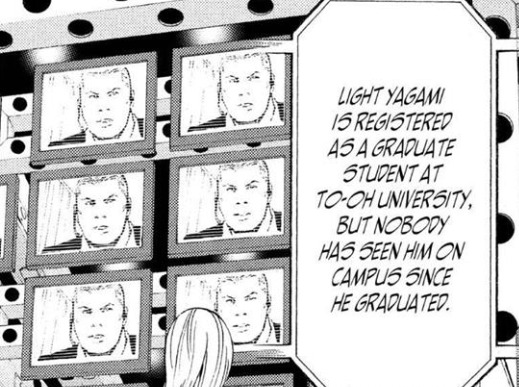
First off, he finished his undergraduate college education. This is a 4 year program, so from spring 2005 to spring 2009, this is part of what keeps Light busy. The other is his two jobs as Kira and as L, each of which must have eaten up a good amount of his time. And yet, Light did at least a minimum of socializing as well:
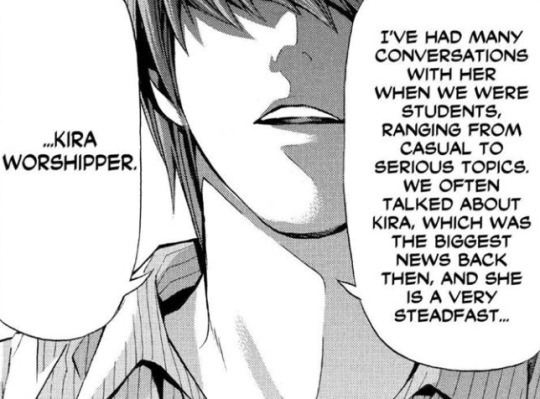
In the first arc, Light and Takada date for exactly two days and knew each other for maybe a month. There isn’t any space for them to be having these in-depth conversations here - it makes much more sense that Light smoothed things over between them after returning from confinement. It’s not like him to leave a blemish like him cheating on and then ghosting Takada stand uncorrected. It appears they became friends afterwards and only fully lost contact when Takada graduated, around a year before Light did (since she didn’t miss a year due to being a Kira suspect)…. This just goes to establish that during the majority of the time-skip, Light absolutely does keep up his charming good boy public image.
He also keeps Misa reasonably happy - though he does not show her any overt affections, he doesn’t neglect her to a degree she’s uncomfortable with and it’s canon that they are sexually active together. (Elaborations: here and here).
I’m bringing all this up immediately because there is often an assumption that the Light we see the most in the second arc is fully reflective of his attitude during the timeskip, which I think is demonstrably untrue.
Nevertheless, it would also be wrong to say Light didn’t change at all.
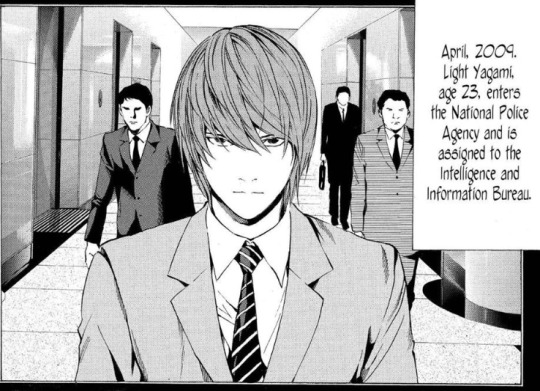
For one, obviously, he gets a job. Contrary to popular opinion, Light’s work is NOT just being on the Kira Task Force. When the second arc starts up properly, he’s already been working on the information bureau for 6 months. And this is canonically not just a cover as Light mentions work from it that he was involved with:
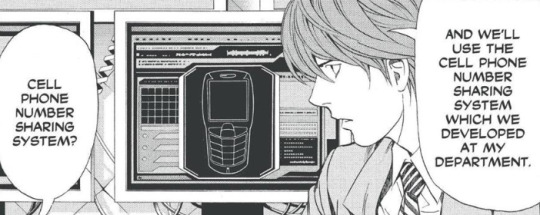
So this brings Light up to 3 labor-intense jobs - NPA, L, Kira. Even with task delegating, that’s a lot of work. If there’s just one word to describe young adult Light it’s simply ‘busy’. He’s just so busy.
The other thing that notably changed is his relationship to Soichiro. This change took root during the Yotsuba Arc and spans further and further now. Though Light still looks up to his father, he is no longer hesitant to talk back to Soichiro - likewise, Soichiro often defers to him through this arc. The two of them have become adults of equal standing by now. Soichiro is no longer the unquestioned patriarch of the Yagami family.
Now, there isn’t a lot of space to examine Light’s adult daily life demeanor in, but the image he gives off in the few scenes we get is that he’s become a more serious and stoic person over his years of being busy and living a double life. The double life aspect is especially highlighted in the brief Yagami family scene.
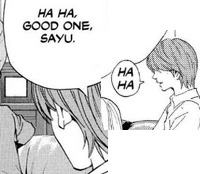
Though we see Light laugh along with his family, his eyes are obscured in both instances. With Light, this is classically a visual cue towards emotional conflict rather than plain lying. The issue here isn’t that he’s faking it, the issue is that his double life existence is taking some amount of mental toll on him.
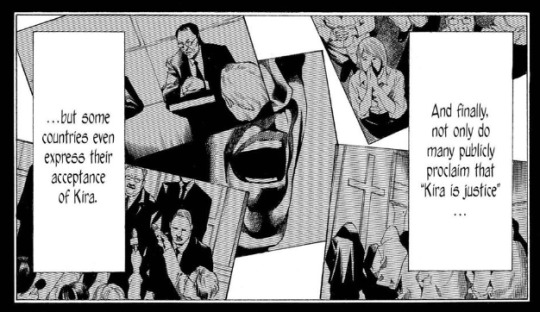
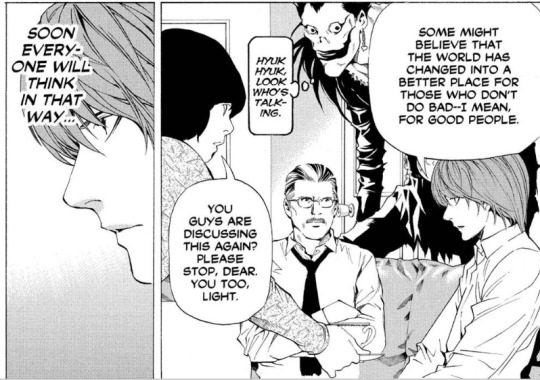
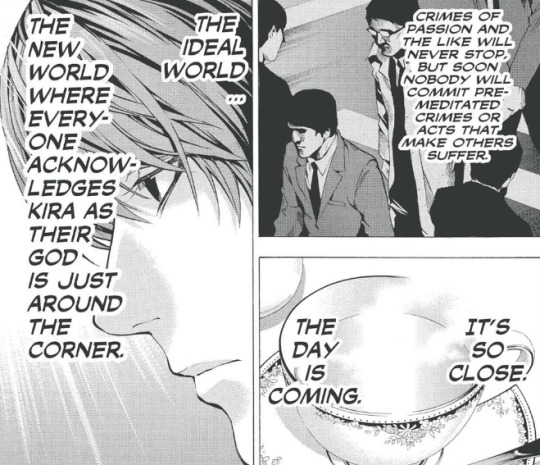
At the start of the second arc we are introduced to the setting information that Kira has been gaining more and more wide-spread acceptance across the globe. Yet the Yagami family stands firmly against Kira, not exactly to Light’s delight. In the end, his family members are the prototypical ‘good people’ that he’s making his new world for in the first place. I’ve discussed ad nausea that Light desires his father approval, but his sister’s and mother’s opinion matter to him as well. Above all other people, Light loves his family. Five years of playing charades and listening to them vehemently disagree with his actions have created a sense of emotional disconnect though, which I think is visible in his vacant expressions during this scene.
Since Light isn’t currently facing any thrilling challenge, I get the feeling that his mentality during this timeframe is a sense of ‘just a bit further until….’. He’s not living in the moment so much as dismissing the moment as temporary inconvenience on his quest towards the ideal he is striving for. (Which isn’t to say I see him as totally emotionally absent. This is just the underlying current.)
And that’s where we have Light at the end of Volume 7. And with Volume 8, he is immediately tossed into great emotional peril with Sayu’s kidnapping. This would be the first big segment you’d need to cover for second arc Light, but it’s already been written out brilliant by casuistor in the second half of this post. The bottom line is: Light changes all his plans to his disadvantage because he loves his sister and wants her safe, hurray! This is relevant to every arc Light really, loving his family is a big constant with him.
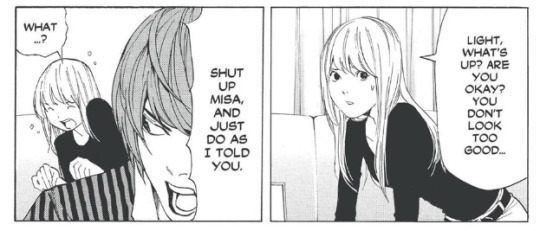
How much this all stresses him out is evident in him getting loud and abrasive, which isn’t much his usual behavior. (Again, I’d argue Misa seems surprised by this outburst more than anything - I don’t believe this has been a pattern between them at any point during the timeskip.)
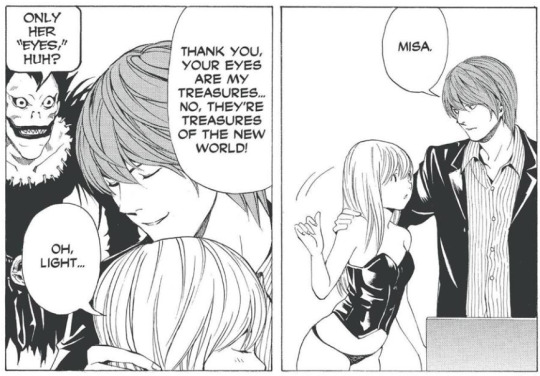
Especially since he goes back to being smarmy as is default with her once the threat to his sister is dealt with.
The other big thing that happens in Volume 8 is obviously him meeting Mello and Near, who are the ones reintroducing struggle into Light’s stagnant life.
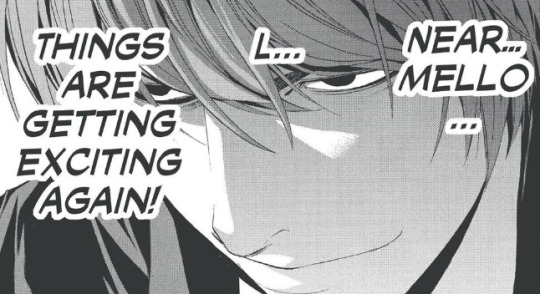
The meeting with Near immediately evokes the tension of a battle with L for Light - for Mello, the association doesn’t come until Sayu is out of immediate danger. Either way, for the time being the presence of these two kind of anchors Light. Having something to fight and schemes to do to keep his brain actively engaged tends to be something that makes him thrive.
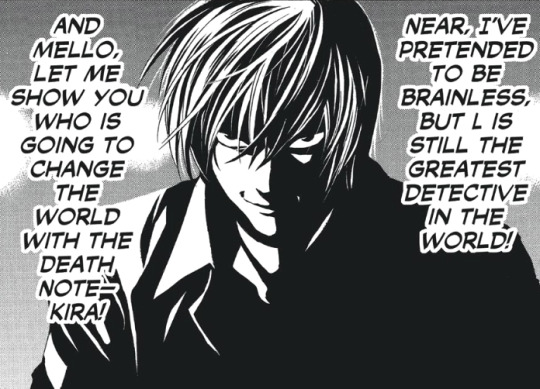
It’s cool that he himself points out how thematically Mello and Near are challenging him on two different facets of his existence. The fact that it’s a challenge is also what sets this apart from Light vs L in the first arc. Though Light hadn’t initially known it, back then L was the established force and Light was the newcomer and challenger. Now Light is established in both areas and Mello and Near are the ones attacking his existent positions - that’s why he views them as roadblocks to outplay rather than as nemeses. He views himself, from the get-go, as the person with the upper hand - this brand of confidence is only possible because the timeskip existed and made Light get used to this as status quo.
And this about sums-up Light in the first half of the second arc. It’s important to note that as far as Light characterization is concerned the second arc really does segment mid volume 9. His father’s death is an event that changes Light significantly on every count.
I wrote it out before, so in the name of not getting super repetitive, here’s the key elements of Soichiro’s death as far as Light is concerned.
It was not what Light planned. He wanted to kill Matsuda, he never even considered his father would volunteer.
Soichiro dies while expressing happiness that Light is not Kira - thus cementing once and for all that Light will never and can never attain his father’s approval that he yearns for.
Soichiro’s statement also implies that he still had doubts about Light’s innocence, even after mock-shooting him in the face and working alongside him for years. Light also learns his father never trusted him fully.
Basically everything Light wants from his father is negated and denied and then Soichiro is dead, leaving Light with no way to rectify things.
We’d established in the early paragraphs of this that a lot of Light acting as Kira was a matter of waiting until his family approves. Soichiro’s passing now makes this ‘until’ an impossibility. And that hurts badly.
Light deals with this by rationalizing everything to the n-th degree. He focuses himself on killing Mello during his father’s death to push the emotions as far away as possible and after that tries to cut himself off from his father emotionally as much as possible. This includes being avoidant to the rest of his family who remind him of the cocktail of unresolved emotions he has simmering below:
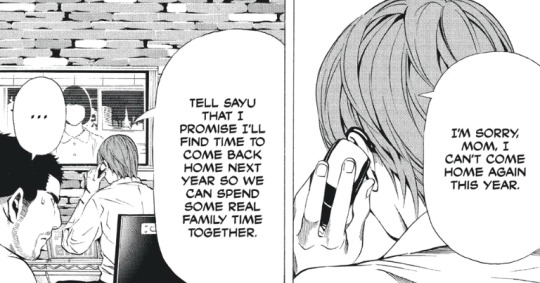
And then changes in his rhetoric and candidness about his thoughts are also immediately apparent. I feel like I cap this scene in every second post I write but it’s simply too relevant to ever be left out:
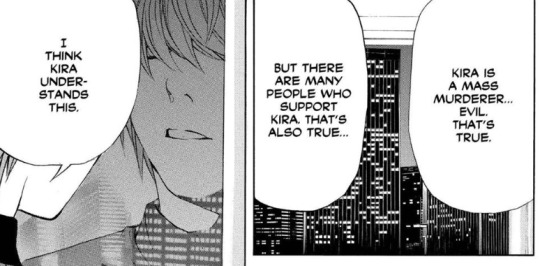
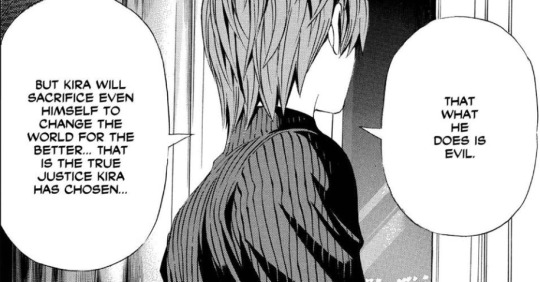
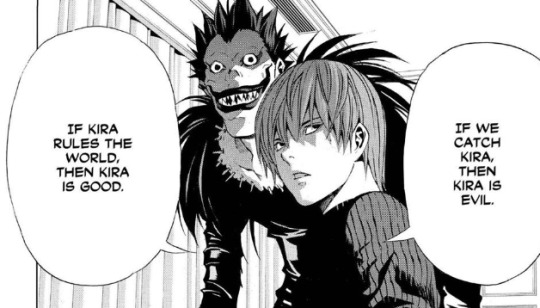
Again, we’re dealing with the hidden eyes visual cue that usually indicates that Light is saying the truth or is very emotionally conflicted about what he’s saying.
So here we have Light fully verbally acknowledging Kira’s evil-ness, to the world, to himself. Soichiro always thought of Kira as evil and how badly that wounded Light is one of the key segments early in the first arc. Now, Soichiro’s stance is eternal, because Soichiro is gone. Light has to acknowledge it as unchangable fact - so he focuses his rhetoric on the idea of sacrifice once more.
This little speech isn’t for the sake of the task force members, it’s Light’s answer to his dead father; Light re-convincing himself of his whole scheme.
None of these are brand-new thoughts for Light, but the timing and intensity with which they surface here is noteworthy.
(Side Note: from this point on, the usage of the hidden eye cue for Light changes a little - up until here it’d been used pretty much exclusively for Light being emotional. Now it is also often used when we see the scene from Aizawa’s perspective, symbolizing his distrust of Light - how he feels he and Light literally cannot talk eye to to eye because Light is lying. The inconsistency in the visual language is kind of annoying, but ah well.)
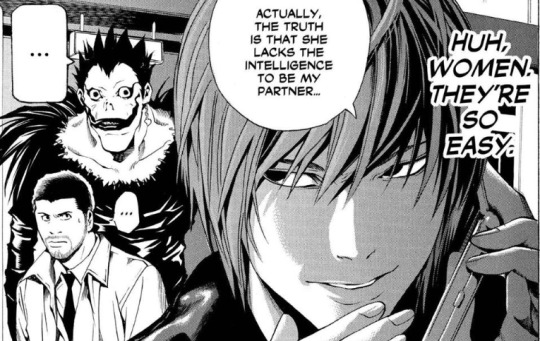
Further, Light loses his qualms about going against Soichiro’s morals in front of the task force. Now that there is no father there to judge him anymore, he doesn’t put too much care into keeping up appearances. Where in the Yotsuba Arc Light had made plenty clear that he’s his father’s good son who would never use people, he just… totally gives up on this now. Though in front of his father Light always acted out that he and Misa are an actual couple, he now cheats on her without so much as a feigned hesitance.
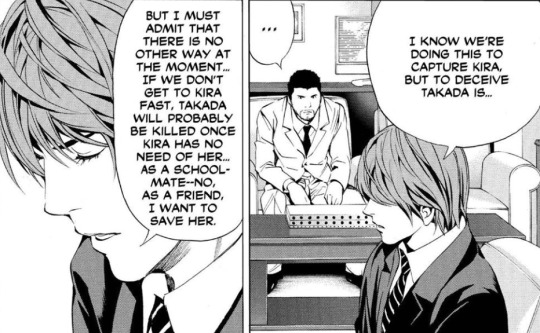
His excuse regarding Takada is half-hearted at best as well. Of course, this in part just relates to Ohba not putting any care into writing women or people’s feelings about women. But on a solely in-universe level, this is a notable shift in how manipulative Light lets people see him as.
The rest of the task force simply does not matter to him as more than mere pawns - their opinion of him is only important when it comes to threat level assessment. Light’s actual morality chain is gone now.
Light’s characterization during this time-frame is a little tough to talk about because there isn’t a lot of added value, if that makes sense? He’s the Light we know but less. His character change isn’t defined by new traits emerging so much as old traits falling away: Light doesn’t joke around anymore, Light doesn’t bother to hide duplicitous nature as much anymore. And notably, Light doesn’t really get emotional key moments anymore either.
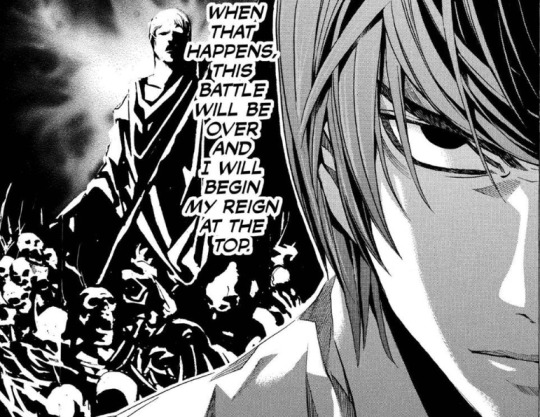
He’s mostly just… this. He’s laser-focused on his plan and his victory while pushing aside any personal elements.
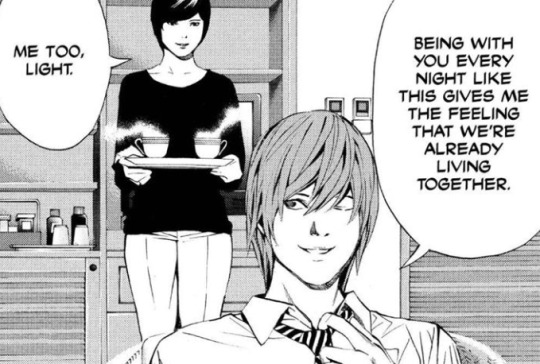
Only with Takada, he amps up the charm again and acts more like his first arc self, but that’s not a positive statement to their relationship.
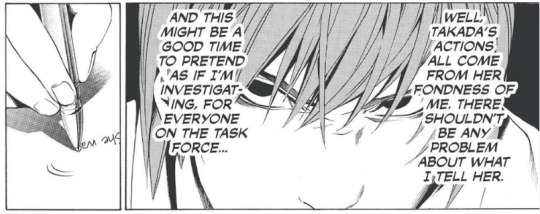
To Light, this is solely functional rather than relaxing. He was going to kill Takada along with everyone else who knows of the notebook right after the 28th, rather than keep her around for use. The only one who would have survived this rampage would have been Mikami, solely because he has the eyes and that is still useful.
And with all of this as our baseline, we move into the finale.
Going into the warehouse, Light is, above all, overconfident. In his mind, he’s won before he even sets foot into the Yellow Box.
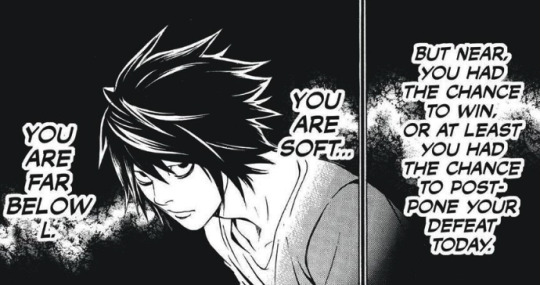
When he unfavorably compares Near to L, he’s in truth saying more about himself and his own mindset than he is saying about Near. He took L more seriously, not because L was better, but because he himself was more alert and aware of the possibility of failure. Earlier in the arc, Light even refers to Near as ‘worse’ than L on the threat-scale... He’s lost all of this now. The level of detached scheming he has reached after his father’s death is to the detriment of his maneuvering ability.
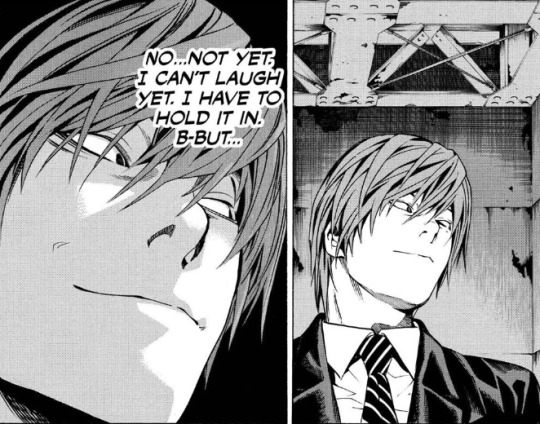
Light now relies on the fact that he’s the established power and views himself as inherently victorious - though Light has always been arrogant, he used to not fully underestimate people this way. He has become complacent in his arrogance - I do think that is related to how dead inside he is generally, too.
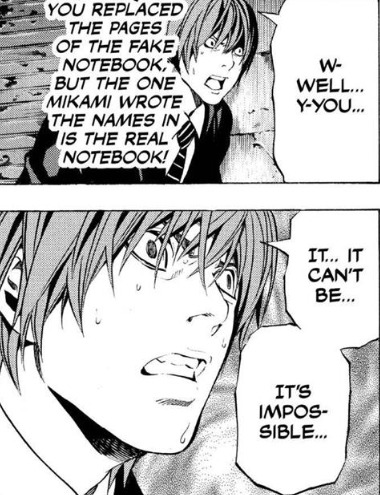
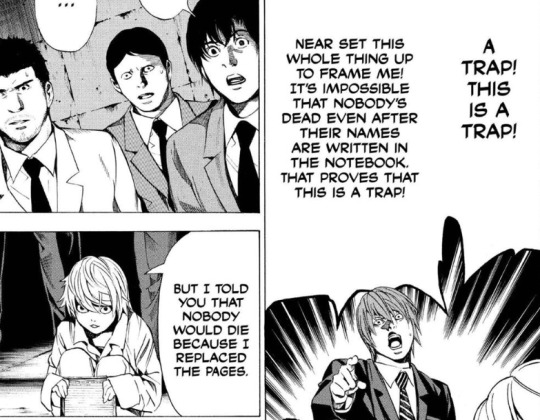
So when it turns out that he has in fact been outplayed, he takes it harsher than he ever took any set-backs before. Instead of taking reparation measures immediately, he reacts with disbelief and badly thought out excuses.
Light is fully caught off-guard by his own failure.
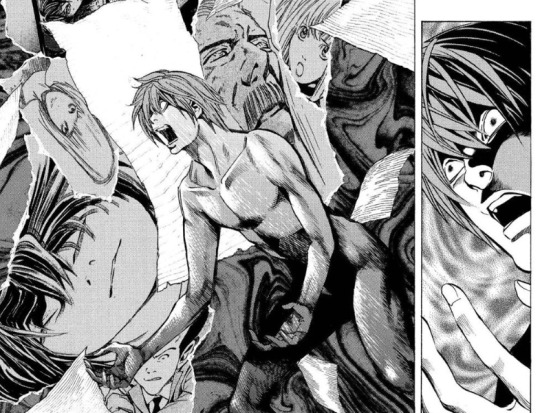
He is laid bare in front of everybody. Light has spent the last five years consistently lying to everybody around him, but now he is proverbially naked. This panel uses the same visual language as when Light regained his memories at the end of the Yotsuba-arc. Here and there, a split-up Light becomes more himself. There, the literally memorywiped Light got reunited with his full plans. Here, Light’s masks fall away and he’s only himself in the eyes of himself and the world.
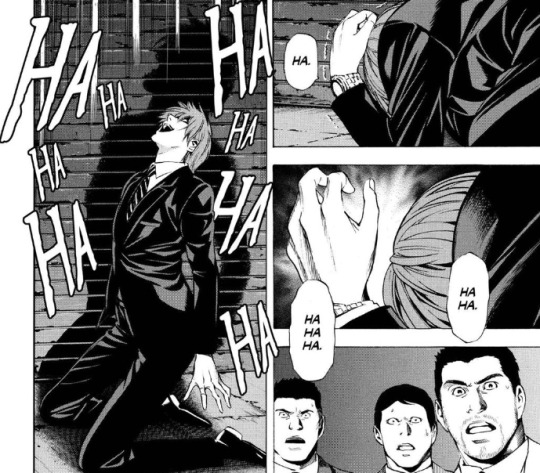
Sometimes all you can do is laugh (tm).
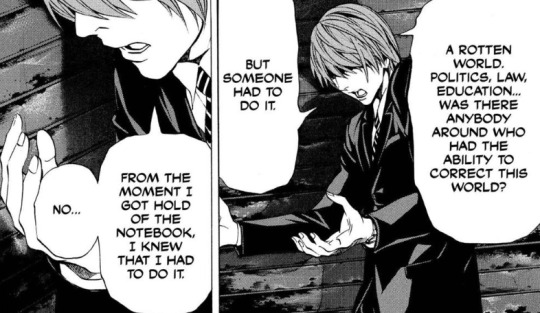
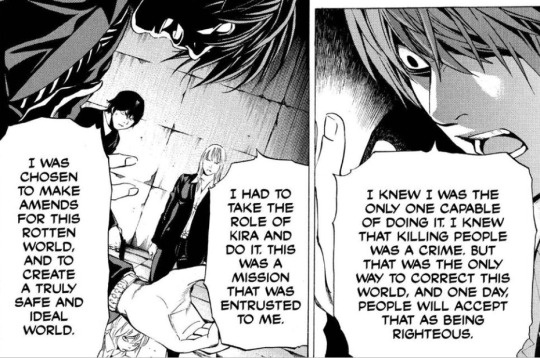
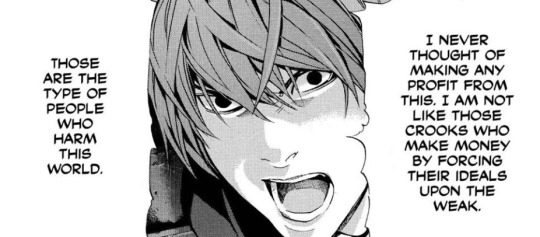
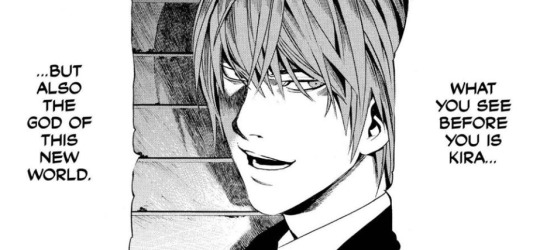
Now Light finally gets to lay all the justifications he’s always told himself about his actions as Kira out in the open. And this time, maybe for the first time ever, literally every part of him believes in it. Now that everything has fallen away, this self-justification is literally all that Light has left and he’ll cling to it like a drowning man clings to a log of wood.
I think this is really the moment where Light ‘comes together’ so to speak. Masks and excuses conflate with the person, become one on every level.
For a large amount of the second arc Light has been driving on scheme-y autopilot but now his heart is fully in it once more. There is no more ‘until’. He’s justice now, he erased the last fraction of doubt now.... and it doesn’t help him.
Light is fully unified as himself for the first time.
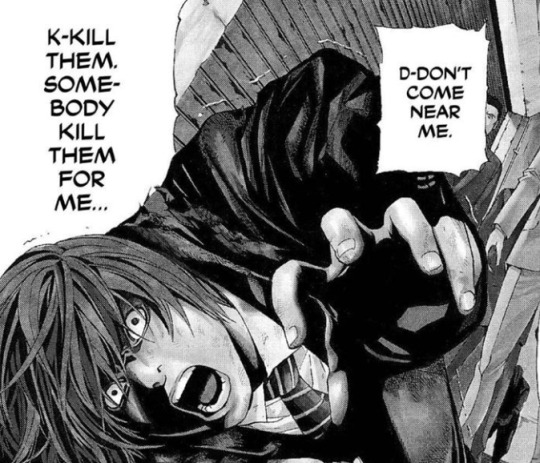
And he’s also completely alone for the first time.
His entire life, Light had people look up to him. He’s always been adored. There has never ever been a situation in which there was truly nobody on Light’s side - not in all of his 23 years, not until now.
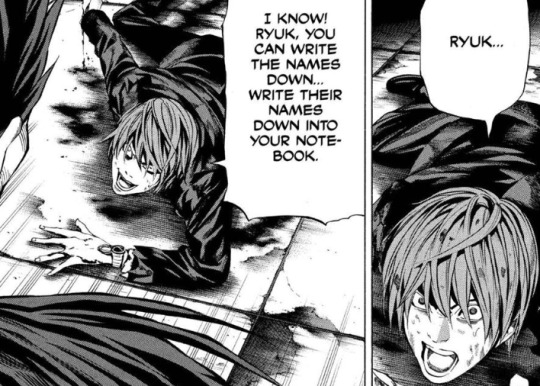
And that’s the one thing Light can truly not believe. The one certainty in his life has always been that people look up to him. Now he’s on the floor, crawling in his own blood, and nobody is his ally. He can’t and won’t believe it.
And that’s why he asks Ryuk for help. And that’s why Ryuk kills him.
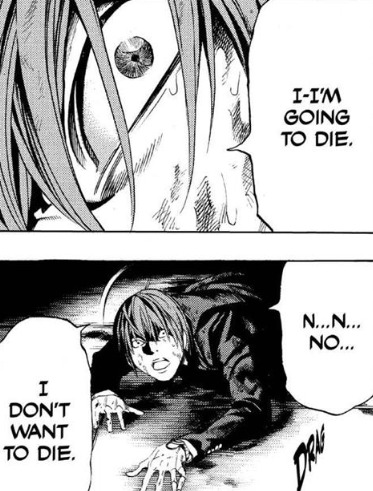
At the very end of his life, Light is a scared child. He comes full circle from the time he found the Death Note and thought he’d die for accidentally using it - he’s back to this fear of death, only this time it’s worse. Then, he had hope to change the world in his days before death. Now, he has changed it, and he realizes that’s not enough. Leaving a legacy is not simply not enough.
Light wants to live.
All these years of feeding himself the narrative of self-sacrifice for the greater good... and at the bottom line below all that, what he really wants is to live.
Too late for that.

#somniumme#Death Note#light yagami#i spent so much time on this#idk if i am actually happy with the warehouse segment#but i'm DONE#thoughts#luna thinks
268 notes
·
View notes
Text
Amaranthine: second generation headcanon list
And after what feels like forever, here is the Amaranthine second-gen list. I had a lot of ideas for this beyond what I covered in the story, and compiling the list gave me yet more, so as a result there's a bonus section of second genners here that have no role or mention in the story here as well.I might or might not write more fics around this AU that might or might not end up including them, but if you want to know more about a particular kid (or their 3E parent, for that matter!), feel free to drop me an ask or whatever :)
Anyway, I hope you find this list (starting under the cut, as always!)interesting, and here's the link to the original story: https://www.fanfiction.net/s/11912649/1/Amaranthine
Note 1: Though I've given birth years for all of them, only Kaguya has a birthday listed, because she's the only one who I assigned a specific birthday to.
Note 2: There are some death dates listed for children here, but though there are quite a few in the bonus section that I imagine to have premature deaths, I’ve only made a point of listing the death dates for those who died as children/babies rather than just generally young. This is because for the ones whose premature deaths occur in adulthood, I haven’t decided a year/age they die at, just general circumstances.
Note 3: Something weird happened when I copy-pasted this from word to the post, so though I've tried to neaten it up the fonts and format may be weird.
Main
Rinka Hayami and Ryuunosuke Chiba
Kaguya Hayami, born 20th May, 2031. She is named Kaguya because of her mother’s fear that somehow, she’d turn out to not really belong to her, that she was a loan from the gods to make up for their cruelty in killing Chiba, and that one day she’d have to give her back. Though Kaguya is a warm natured person who gets along with others and expresses her emotions easily, she is as reserved and quiet as both her parents are/were. Though mother and daughter have always gotten on, the night Hayami revealed everything about the past to her marked a new, deeper closeness between them. Kaguya’s closest childhood/school friends are Iruka and Ageha Akasaka (see below).
Hinano Kurahashi
Masami Akasaka (former surname Tachibana), born 2023. Her bio parents were childhood friends of her father, and they made him and Hinano her legal guardians, which is how they came to adopt her when she was four and her parents died in an accident. Though she calls them ‘Papa Shinji’ and ‘Mama Hinano’ all her life, she considers them her parents as much as her bio ones, and loves them deeply. Masami is cheerful and happy-go-lucky, and has a wide variety of interests. She goes on to have a large family herself.
Suzume Akasaka, born 2027. Elder twin by fifteen minutes, she’s basically a brown-eyed version of Hinano, except more sparky and argumentative. In elementary and early middle school, she gets into a lot of fights-though usually with good intention-but she grows out of this before she can be labelled a delinquent, much to everyone’s relief. She adores dogs most of all and thus ends up running a dog shelter.
Tsubame Akasaka, born 2027. Despite being the younger twin, she tends to be the bossier, take-charge one in a way more befitting an older sibling. She loves pranks, especially twin-switch ones, and would have probably gotten along well with Rio in another life, and later on life this translates to a general carefree attitude about life.
Iruka ‘Iru’ Akasaka, born 2030. He often despairs at being the only brother in a bunch of sisters, but on the other hand it means that he is well acquaintance with the quirks and foibles of females and is rarely fazed by anything (though he tends to be the straight man in most social interactions). This makes him a bit of an oddity amongst his classmates and friends throughout his life, but also leaves them in awe of him. He tries on a variety of careers and eventually settles on training as a teacher and working for The Sanctuary (the school that Megu, Hinano and Hayami eventually make from the old 3E campus once Gakuho Asano dies) once it opens. He goes by his nickname because he finds his actual name a little dorky (“seriously, who wants to be named ‘dolphin’?”)
Ageha ‘Acchan’ Akasaka, born 2032. A precocious reader and quick to pick up mathematical concepts, she ends up skipping a year near the end of elementary school, and ends up in the same year as Kaguya for middle and high school. Physically speaking, she’s the one who resembles her father the most.
Megu Kataoka
Misa Watanabe (former surname Takechi), born 2036. The elder twin by ten minutes, Misa is fierce and overprotective of her two little brothers, and has always been mature for her age. She is the one that remembers the most of her old parents, and though she has no wish to reconnect with that aspect of her life, she bears the scars in the form of having trouble in letting herself be helped. She develops a passion for the stars and pursues this to become one of the most influential astronomers of her generation.
Manabu Watanabe (former surname Takechi), born 2036. Though he’s technically the quieter twin, Manabu is no less protective or dedicated than his sister is. He eventually goes on to be a policeman and values the justice system highly, so when his mother dies and he receives her letter, the contents don’t sit easy with him. He does eventually reconcile it though, and goes on to work closely with The Sanctuary afterwards.
Yuuma Watanabe (former surname Takechi, no first name before adoption), born 2037. Sweet and imaginative, Yuuma can seem as gentlemanly and kind as his namesake, but a lot more dreamy and sometimes more innocent. He struggles in school most of his life, but works hard and makes it through, and becomes a relatively successful novelist-many of the squad, Isogai included, become fans of his works.
Bonus
Squad members
Touka Yada
Eriko Sakakibara, born 2020. The unplanned, unwanted consequence of a mission when Yada was 20, Eriko was abandoned and eventually adopted, and knows nothing of her biological mother’s background. Her adoptive parents were not very loving or warm parents and as a result Eriko had a rough, rebellious adolescence which ended in a teenage pregnancy that resulted in her beloved daughter, Marika (who eventually ends up in the first 3E that Megu, Hinano and Hayami teach). This gave Eriko a purpose, and she pulled herself together worked extremely hard to be able to bring her up alone, giving her the love and nurturing that she herself never experienced and eventually becoming the co-owner of a successful cat cafe.
Takuya Muramatsu
Natsuya Muramatsu, born 2027.Though his brash behaviour and relaxed attitude to dress code make him seem a lot like the stereotypical delinquent in a similar way to how his father appeared, in truth he is a lot more shrewd, sly and smart than that, which makes him the perfect candidate to take over Takuya’s role in the squad when the time comes.
Shin’ya Muramatsu, born 2028. A quiet guy who goes with the flow and prefers to stay out of conflict, Shin’ya is more than happy to stay behind the scenes and be the cook while Natsuya takes the lead and does most of the squad-related things.
Tomohito Sugino and Yukiko Kanzaki
Nanako Sugino, born 2024, deceased 2027. Though she was unplanned and initially seen as an inconvenience by her parents, she was loved deeply and her death due to a sickness and medical negligence hit both her parents hard. Her memory is often used as a driving motivation behind the squad’s targeting of corrupt medical industries and hospitals (things that contributed to Nanako’s death). Nanako was basically a typical happy three year old who loved fairies and unicorns. She was also notably pretty.
Yuuma Isogai
Megumi Isogai, born 2027. She would have been named ‘Megu’, but her mother thought that was an incomplete name and argued for other alternatives-‘Megumi’ was the compromise in the end, but she is still definitely named for Megu Kataoka. Anyway, she never seems to fit in with her family despite being very much her father’s favourite (she even looks a lot like him, minus the ahoge), and after a childhood of railing against a sheltered upbringing, she runs away from home at the age of 17 and is never heard of again. It is unclear how much she knew of her family’s activities prior to this.
Mayuri Isogai, born 2030. Probably the most docile and compliant of the three Isogai daughters, she is basically the other extreme of having such a sheltered, insular childhood. She goes on to take on a job in one of Yada’s legitimate business ventures, reporting back relevant information to her family and the rest of the squad but otherwise keeping on the right side of the law. She’s pleasant enough and fiercely loyal to her family, but doesn’t have much of a personality.
Tsumugi Isogai, born 2032. Though she tended to get a little restless from being so coddled, being a Tsumugi never actually minded it that much. She’s generally a chill person, though with a slightly cold streak-she tends to be hurtful in her words and rarely shows much compassion to others apart from her family (except for Megumi, who she always dismisses as ‘causing drama’ whenever she’s mentioned). She goes on to become one of the squad’s main assassins.
Saki Isogai, born 2033. Probably the most relaxed and ‘normal’ of the Isogai siblings, Saki decides on a law-abiding life, though she always stays close to her family-she takes the option of pretending she knows nothing. After all, her upbringing was such that such a thing is plausible. In taking this approach, she proves herself more strategic and calculating than most people around her would give her credit for, especially as she seems so straightforward. Saki is also the only sibling who has inherited the Isogai ahoge.
Hiroto Maehara
(Note: All of these kids are the result of reckless flings/affairs/one-night stands that occur during, but not related to, various squad missions)
Yuka Yamada, born 2022. Abandoned by her young mother as a toddler, Yuka has a rough, abusive childhood in care and winds up gravitating towards crime as a teenager and running away. Various tricky life events occur before she eventually cleans up her act and gets work at a florists. During one of the rough years, she meets and helps Megumi Isogai, and though their friendship lasts only a few months and they never kept in contact, that time helped to contribute towards Yuka’s subsequent decision to straighten out.
Kimiya Satsuki, born 2025. The result of an affair, Kimiya has no idea that the person he calls ‘Dad’ is not actually his father. He is the second of four children (one older brother, one younger brother, one younger sister), and has a happy childhood in a coastal town, and grows up to run his family inn.
Kazunari Taira, born 2031, deceased 2040. Small for his age, Kazunari was hyperactive and funny and full of plans and ideas. The only child that Maehara actually had a (distant but still fond) relationship with, Kazunari died in what was disguised as an accident, but was a murder made as a threat to the squad (his mother is oblivious to this truth, thankfully). After his death, Maehara vowed to be a lot more careful in the future so that he didn’t have any more children who could come to such harm.
Anna-Louisa ‘Ally’ Warren (nee Harding), born 2039. Raised in America, Anna had a slightly tough but generally loving childhood, and though she always wondered about her father (especially as her mother couldn’t give many answers beyond the vague), it was not until well into her adult life after a bitter divorce that she was motivated to go to Japan to try and track him down. She did not succeed, but ended up seduced by the culture and decided to make a fresh start there. She ended up working at one of Yada’s legitimate business ventures, and Yada instantly suspected who she could be, but decided to keep it secret from both of them.
Other non-squad members
Taisei Yoshida
Seiko Yoshida, born 2026. A pretty, popular girl, Seiko always sensed that there’s a part of her father that comes from another sort of world (as she thinks of it), and is the only one of her siblings who is interested in it. As a result, she ends up often helping her father pass on cards from Isogai and things like that, and ends up working for Yuzuki Fuwa in her quest to become a private detective (which she achieves). Childhood friends with the Itou kids (see below), she dates and eventually marries Ichiro, the eldest.
Taichi Yoshida, born 2029. Loud, annoying but ultimately well meaning, he’s basically a typical annoying little brother towards Seiko, and a protective-but-teasing older brother to Ema. He becomes part of a boy band in his late teens until his mid-twenties (he’s quite the good singer), but then when they disband goes to work for his dad’s garage.
Ema Yoshida, born 2032. Otherwise super-girly and basically tiny and sweet and adorable, she surprises everyone by showing an aptitudes for mechanics, and seems to take a little too much pleasure from subverting expectations. She ends up going to the same university as Ageha, and though they end up in a lot of the same classes during their degrees and know each other well as a result, they don’t connect enough for them to realise any connections between their families.
Sumire Hara
Ichiro Itou, born 2026. A brotherly, caring type who charms everyone he encounters, the handsome Ichiro is pretty much as popular as Seiko and in high school they’re basically the golden couple. He has an odd but deep interest in different types of tea.
Asahi Itou, born 2028. Eldest of the triplets, Asahi is a headstrong, fierce girl who knows what she wants and just aims for it, with little hesitation. A feminist, she’s radical enough in her views as a young girl to rail against the fact that her mother is a housewife, and does not understand why she would be happy with that or how she could choose that. She only gains that understanding as an adult, and thus for a lot of her life her relationship with her mother is tense.
Mahiru Itou, born 2028. Headstrong like Asahi, but more measured than fierce, Mahiru is generally considered the more sensible of the triplets. She eventually goes on to be a criminal lawyer, and has several close brushes with the squad, which causes her mother no end of anxiety, though Sumire never tells her precisely why she keeps begging Mahiru to find another job.
Yuuhi Itou, born 2028. The youngest of the triplets. He’s close friends with Taichi Yoshida, being the quieter, more anxious straight man to Taichi’s impulsive, reckless goofball, and he also joins the band that Taichi joins as a late teen (he plays the drums). When the band splits up, he goes into music production. He struggles with anxiety for a lot of his life, but manages it.
Kaoru Itou, born 2030. Very interested in fashion, Kaoru is flamboyant, imaginative and creative, and loves to make clothes and accessories for his nearest and dearest, and makes a successful career out of it. He moves to Australia as an adult, but visits Japan constantly.
Mirai Itou, born 2037. A surprise child, he’s very much coddled and adored by the rest of his family, and acts a little spoiled because of this. However he’s a hardworking, passionate person, and as someone who never really fits in with the strict educational system (though he does well), he is eventually motivated to also work for The Sanctuary.
Kirara Hazama
Shiki Nakajima, born and deceased 2027. A stillborn son, his name is written to mean ‘poem’. Though his parents think of him pretty much every day and he is still thought of as part of the family (his name is still on the plaque listing the family’s names outside the Nakajima’s front door), he is not talked about.
Bunko Nakajima, born 2033. A sunny faced, sunny natured girl, nobody can believe that she and Hazama are related when they look at the two of them together. The only feature they appear to share is curly hair, and even that’s a stretch. However, Bunko is just as book obsessed as her mother (and her father, for that matter) and has a similar dark sense of humour and interest/knowledge in the occult and she can be creepy when she wants to be. She starts a book-critique blog called ‘Literary Child’ (which is what her name means) that becomes a hit in the book world.
Taiga Okajima
Kiyomi Okajima, born 2031. Brash, down to earth, overly blunt and not easily fazed, Kiyomi is not someone you want to challenge. A lesbian, she finds it hilarious that her father’s reaction to her coming out in her teens is to be happy that he can pass down his own porn collection from his adolescence instead of having to find male porn to give to her. Though she does turn it down anyway.
Karma Akabane
Saito Akabane, born 2028. Physically resembling his father, he is nothing like him personality wise, being a straight-laced, overly serious sort of person who goes onto become a doctor. It horrifies him when he learns of his father’s past and the sort of people his former classmates became, and his struggle to understand it causes a rift in their relationship for a while, but they reconcile when Saito has his own children.
Toshiko Akabane, born 2029. A bit more cheeky and relaxed, Toshiko does seem a lot more like her father, personality wise. Though she’s generally someone who believes in the law, for some reason she finds it easier to accept her father’s past. Witnessing horrible experiences classmates and friends go through, she is eventually motivated to open a women’s shelter, walking away from a shiny government job to achieve this. She allows the squad to refer people they rescue to her.
2 notes
·
View notes